Lona Manning's Blog, page 11
May 8, 2023
CMP#142 Plots and Plausibility, Marianne
 This blog explores social attitudes in Jane Austen's time, discusses her novels, reviews forgotten 18th century novels, and throws
some occasional shade
at the modern academy. The introductory post is here. My "six simple questions for academics" post is here.CMP#142 More (Unfounded) Theories about Hidden Stories in Austen
This blog explores social attitudes in Jane Austen's time, discusses her novels, reviews forgotten 18th century novels, and throws
some occasional shade
at the modern academy. The introductory post is here. My "six simple questions for academics" post is here.CMP#142 More (Unfounded) Theories about Hidden Stories in Austen
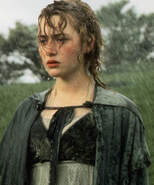 Regret
In an earlier post,
I discussed some theories about Austen's plots which struck me as being rather far-fetched. This post is a longer response to one of those theories.
Regret
In an earlier post,
I discussed some theories about Austen's plots which struck me as being rather far-fetched. This post is a longer response to one of those theories.Last year, I attended a talk by Robert Morrison, a prominent expert on Austen and the Regency. (His book, The Regency Years, is an informative and entertaining survey of the Regency period.) I was quite surprised when he floated the theory that Marianne got pregnant in Sense and Sensibility. Further, he didn't claim that this interpretation was his own take on the novel, in which case I wouldn’t raise an objection. He attributes the idea to Jane Austen--he thinks Austen hinted that Marianne got pregnant.
If it was worth Professor Morrison's time to devote a full lecture to this idea, it's worth my time to lay out the reasons why I disagree. And I am glad that mulling over his ideas gave me a good reason to re-read Sense and Sensibility, because I noticed things I hadn't paid any attention to before. That's mostly for my next post. Briefly, my rebuttal is: The text doesn’t support the theory that Marianne got pregnant, but rather contradicts it. The tenor of the times wouldn’t allow for such a book to be published, because you can't have a girl of good family have sex outside of marriage without also being explicit about the consequences which would befall her. The longer rebuttal is below. But first, let's look at the textual evidence in favor of the theory. The timeline of the novel doesn’t contradict the possibility that Marianne had a bun in the oven...
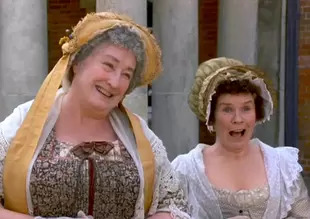 Mrs. Jennings and her daughter Charlotte PalmerHow the timeline works
Mrs. Jennings and her daughter Charlotte PalmerHow the timeline worksSeptember 20-- Marianne and Willoughby meet (according to scholar Ellen Moody’s calendar).
October 30--the planned picnic to view the Whitwell estate and grounds is cancelled by Colonel Brandon’s abrupt departure. Mrs. Jennings wonders if there's a problem with Miss Williams, whom she mistakenly thinks is Brandon’s ‘natural daughter.' This introduces the topic of illegitimacy into the novel. Instead of staying with the rest of the disappointed picnickers, Marianne and Willoughby spend the day together unchaperoned. We are told that they toured Allenham, the home of Willoughby's aged relative Mrs. Smith. Then and now, if a young couple in the first flush of mutual infatuation disappear for hours, what else are we to think?
You could protest that Willoughby wouldn't whisk Marianne into the spare bedroom at Allenham when Mrs. Smith is sitting in the drawing room one floor below and there is a full complement of servants around as well, but let's face it--ardent young lovers will find a place and a time.
Early November--Willoughby leaves abruptly.
Late November--Marianne suspects she is pregnant. She therefore has every reason, in addition to being madly in love, to accept Mrs. Jenning’s invitation to go down to London in hopes of being reunited with Willoughby.
January--Marianne is in her third month of pregnancy in London and expecting to hear from Willoughby every moment. She is anxious, restless and not interested in food. She confides in no-one. She's moody and snappish and barely civil to Mrs. Jennings, who is preoccupied with the birth of her daughter Charlotte's first baby. Marianne and Elinor run into Willoughby, and Marianne’s hopes are shattered when she learns he's engaged to an heiress. Marianne's mother, unaware of her dilemma, thinks it would be better for her to stay in London. In Barton, she would have nothing to do but eat her heart out over Willoughby; London might offer her more diversions.
Colonel Brandon absolves Marianne of wrong-doing. "Her sufferings proceed from no misconduct, and can bring no disgrace.” He contrasts Marianne with Eliza. Marianne can “turn with gratitude towards her own condition, [emphasis added] when she compares it with that of my poor Eliza, when she considers the wretched and hopeless situation of this poor girl… surely this comparison must have its use with her. She will feel her own sufferings to be nothing." Is Austen hinting that Marianne "in an interesting condition," as people used to say? Is this one of Austen's dramatic moments when we, the reader, know the truth but we watch, as Brandon delusively thinks Marianne is pure as the driven snow?
Early April-- Marianne and Elinor travel with the Palmers to their country estate, which gets them partway home. Marianne plans to indulge in long walks, but her shoes and stockings get wet and she falls ill, as one does. Mrs. Palmer hurries her infant to safety away from the infection, and Mr. Palmer follows. Thus there are fewer witnesses to what is really happening; Marianne doesn’t have a bad post-viral infection: she is pregnant and possibly miscarrying.
Mid-April-- Marianne is very ill and Mrs. Jennings fears she will die. Colonel Brandon hurries to fetch Mrs. Dashwood, who hopes to get to Cleveland in time to see her “darling child,” so he is also away from Cleveland at the critical time of her illness.
Marianne either miscarries or has a premature child who is whisked away to a distant cottage.
End of April-- Marianne recovers and is well enough to travel home to Barton. She is chastened by her experience.
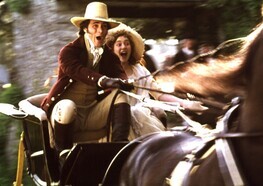 HeedlessMarianne – innocent or romantic?
HeedlessMarianne – innocent or romantic?Now, for my objections... When Marianne disappears for hours with Willoughby and then says she toured Allenham, Austen gives more emphasis to Marianne's rudeness than her lack of prudence: “it seemed very unlikely [to Elinor] that Willoughby should propose, or Marianne consent, to enter the house while Mrs. Smith was in it, with whom Marianne had not the smallest acquaintance.” Elinor scolds Marianne: “I would not go while Mrs. Smith was there.” Going “with no other companion than Mr. Willoughby,” is a secondary concern.
If I remember correctly, Professor Morrison suggested that Marianne did not really understand that premarital sex was wrong. I don’t think it would be possible for a girl Marianne’s age to not understand that sex outside of marriage (fornication) was wrong. Not just wrong. Very wrong. She couldn't have been brought up in the Anglican church and not know this very well, or not understood what society thought of fallen women. You couldn’t know about novels like Pamela and Clarissa or The Vicar of Wakefield without understanding that a girl was supposed chose death before dishonor, or she ought to die if she lost her virtue. Also, when Mrs. Jennings raises the issue of Brandon's 'natural daughter,' she lowers her voice and adds: "We will not say how near, for fear of shocking the young ladies.” It's understood that the young ladies are virtuous enough to be shocked,
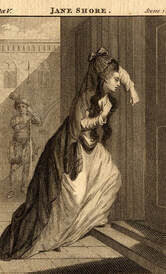 Jane Shore, famous mistress to Edward IV, was publicly shamed Alternatively, Marianne, as a devoted Romantic, didn’t think extra-marital sex was wrong. After all, she believes that hiding her love for Willoughby was a stupid social convention: “a disgraceful subjection of reason to common-place and mistaken notions.” The “common-place and mistaken notion” referenced here is the idea that ladies absolutely should not show their preference for a man before he has paid his addresses to her. This pops up
again and again
in novels. Is Marianne defying foolish and mistaken conventions and having sex with Willoughby? Professor Morrison points to Marianne saying to Elinor: “if there had been any real impropriety in what I did, I should have been sensible of it at the time, for we always know when we are acting wrong, and with such a conviction I could have had no pleasure.”
Jane Shore, famous mistress to Edward IV, was publicly shamed Alternatively, Marianne, as a devoted Romantic, didn’t think extra-marital sex was wrong. After all, she believes that hiding her love for Willoughby was a stupid social convention: “a disgraceful subjection of reason to common-place and mistaken notions.” The “common-place and mistaken notion” referenced here is the idea that ladies absolutely should not show their preference for a man before he has paid his addresses to her. This pops up
again and again
in novels. Is Marianne defying foolish and mistaken conventions and having sex with Willoughby? Professor Morrison points to Marianne saying to Elinor: “if there had been any real impropriety in what I did, I should have been sensible of it at the time, for we always know when we are acting wrong, and with such a conviction I could have had no pleasure.” But fornication outside of marriage is much more than an “impropriety,” like chewing your food with your mouth open or something. It was regarded as a crime, and that's how Elinor refers to it elsewhere.
Fornication was less serious than adultery, but for centuries, girls and women and sometimes even men were publicly punished by the ecclesiastical courts in England and elsewhere. Up until about the 1770s in England, you could be publicly whipped in front of your community and congregation for fornication.
Check out this link and scroll down to “sexual offences.” The punishment had abated but the strong social stigma remained. And let's not forget that in other parts of the world, adultery and fornication are still punished as crimes today.
There were characters in novels of this era who argued that strictures on sex outside of marriage were ridiculous and antiquated, but these were the scurrilous villains and they made these arguments to seduce naïve girls, such as in The Farmer of Inglewood Forest. One free-thinking heroine, Adeline Mowbray, ultimately regretted her choices. It's hard to believe Marianne could wave away fornication as an "impropriety."
If Marianne was pregnant, this would have given her a strong claim to demand that Willoughby marry her. She could have turned to her only living male relative, John Dashwood, to insist that Willoughby do the honorable thing. Granted, John Dashwood wouldn't be as generous in Darcy was in bribing Wickham to marry Lydia, but possibly he would have paid out something to keep the scandal from disconcerting his wife and mother-in-law. But Marianne does not assert her claim. She is wild to return to her home and her mother, a course of action that would lead to the inevitable discovery of her condition and the complete disgrace of the family, and the ruin of Elinor and Margaret's marriage prospects. Marianne’s close call – the key passage
The narrator's description of Marianne's own thoughts undermines the theory that she went all the way with Willoughby. After Colonel Brandon hears that Willoughby has jilted Marianne for Miss Grey, he hurries round to Mrs. Jennings and reveals that his ward Eliza was seduced by Willoughby and has recently borne his child. Brandon held the story back when he thought Marianne was engaged; now that she is jilted, he hopes the revelation of Willoughby’s true character will help mend her broken heart. Elinor agrees, and she goes upstairs and tells Marianne the news. Marianne condemns Willoughby's seduction of Miss Williams, and not merely out of jealousy. She condemns the act. And here, I think is a key passage: “She felt the loss of Willoughby’s character yet more heavily than she had felt the loss of his heart; his seduction and desertion of Miss Williams, the misery of that poor girl,”
She feels that she had a close call herself: “and the doubt of what his designs might once have been on herself, preyed altogether so much on her spirits, that she could not bring herself to speak of what she felt even to Elinor.” [emphasis added] "his designs" clearly means, that Marianne is asking herself, did Willoughby have honorable intentions or was he just trying to seduce me?
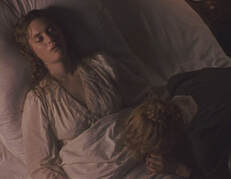 Could Marianne have had a secret miscarriage?
Could Marianne have had a secret miscarriage?In my opinion, Austen gives an accurate description of a bad cold developing into a post-viral infection, but I won’t repeat it all here. As Marianne falls ill at Cleveland, she does not hide herself away. She insists on staying in the parlour until she is absolutely too ill to do so. She goes to bed only reluctantly, because she still hopes to be on the road to Barton and her mother soon.
The apothecary recognized that whatever was ailing Marianne, it was probably infectious. Marianne possibly has bacterial pneumonia or a strep infection which we don’t think of as fatal today, but they were, and still can be. There is also a forgotten infectious disease called Lemierre’s syndrome which afflicts young adults and which was often fatal before the advent of antibiotics. But many a character in an old novel fell deathly ill without a precise modern diagnosis.
Professor Morrison suggested that Mrs. Palmer's whisking her child away strengthened the supposition that Marianne was pregnant. The word “infant,” the focus on Mrs. Palmer’s child, was intended to bring children to our minds, along with Mrs. Dashwood’s thinking of Marianne, an almost adult, as "her darling child,” as she rushed to Cleveland. I don’t find this at all convincing. I think, given the miserably high infant mortality rates of the day, taking your baby away from a possible case of infectious disease would have been standard practise. And a mother's child is always her baby.
Marianne had round-the-clock attendants at her bedside while she was ill. If Marianne had a miscarriage during the height of her illness, it would be known to Elinor, the apothecary, Mrs. Jennings, Mrs. Jenning’s maid Betsy--who is an inveterate gossip, as is Mrs. Jennings--and perhaps other servants of the household. There is the bloody linen to consider, as well--how could it be hidden from the servants?What's the Point?
If Marianne had a secret pregnancy, what is the point? What is Austen saying? Fornication is okay if you don't get caught? The patriarchy is bad? (This, I think, is the meaning that Morrison ascribes to it, because he reacted very feelingly when he discussed the plight of all the real-life Eliza Williamses of the past).
Next post, why did Willoughby go to Cleveland?
Previous post: Three Scholarly Books
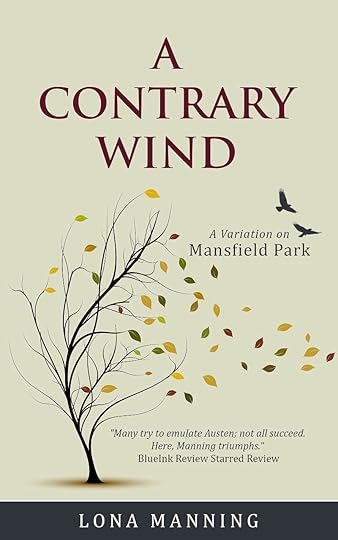 In Mansfield Park, Maria Bertram Rushworth runs off with Henry Crawford and lives with him for some unspecified period of time. There is no mention of any infant. In A Contrary Wind, my variation on Mansfield Park, things turn out differently. For more about my books,
click here.
In Mansfield Park, Maria Bertram Rushworth runs off with Henry Crawford and lives with him for some unspecified period of time. There is no mention of any infant. In A Contrary Wind, my variation on Mansfield Park, things turn out differently. For more about my books,
click here.
Published on May 08, 2023 00:00
April 27, 2023
CMP#141 Three Scholarly Books about Austen
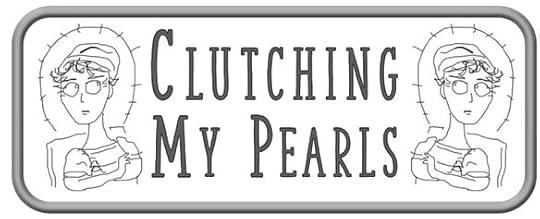 Clutching My Pearls is about Jane Austen and the times she lived in.
Click here
for the first in the series.
CMP#141 Three Scholarly Books on Austen
Clutching My Pearls is about Jane Austen and the times she lived in.
Click here
for the first in the series.
CMP#141 Three Scholarly Books on Austen
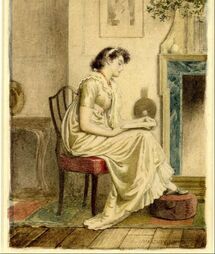 For devoted Janeites, an interest in Jane Austen leads to an interest in learning more about her artistry and her life and times. If you are ready for some deep dives into Jane Austen, either for yourself or as a gift for a friend, there is an overwhelming number of titles to choose from. Even if you limited yourself to books with titles that start with "Jane Austen and..." you'd have enough reading to keep you busy for years. There's ....and Critical Theory, ....and the Enlightenment, ...and Literary Theory, ...and Philosophy, ...and Her Readers, ...and The State, ...and The State of the Nation, ...and Reflective Selfhood, ....and Leisure, ...and The Ethics of Life, ...and Altruism, ....and Her World, ...and Other Minds: Ordinary Language Philosophy, ...and The Reformation, ...and Performance, ...and Animals, ....and Her Art, ...and The Ethics of Description, ...and The Drama of Woman, ...and the English Landscape, ...and so on!
For devoted Janeites, an interest in Jane Austen leads to an interest in learning more about her artistry and her life and times. If you are ready for some deep dives into Jane Austen, either for yourself or as a gift for a friend, there is an overwhelming number of titles to choose from. Even if you limited yourself to books with titles that start with "Jane Austen and..." you'd have enough reading to keep you busy for years. There's ....and Critical Theory, ....and the Enlightenment, ...and Literary Theory, ...and Philosophy, ...and Her Readers, ...and The State, ...and The State of the Nation, ...and Reflective Selfhood, ....and Leisure, ...and The Ethics of Life, ...and Altruism, ....and Her World, ...and Other Minds: Ordinary Language Philosophy, ...and The Reformation, ...and Performance, ...and Animals, ....and Her Art, ...and The Ethics of Description, ...and The Drama of Woman, ...and the English Landscape, ...and so on! All of this reading would be pricey if you were buying the volumes, but if you are a university alumnus, you might check with them to see if you have access to their library. I've also bought a community library card from my local university. You can also speak to your local public librarian about getting inter-library loans. JASNA Canada has an online catalogue of books about Jane Austen and you can borrow from them if you are a member.
Here are three scholarly books that I've found worthwhile: Jane Austen and the Clergy (1994) by Irene Collins
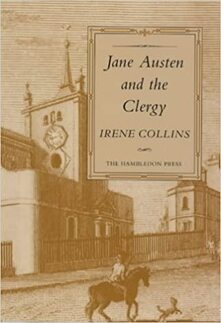 The scope of Irene Collins's book is much broader than the role of the clergy in Austen's time. I bought it expecting to learn more about the nuts and bolts of a clergyman's life, and though I did learn some things, the author does not delve into explanations of the difference between a rector and a vicar, and she assumes her readers know what a chancel is. Most of the book is a social history of clergyman, with a chapter on clergyman's wives as well. This chapter on wives has much interesting detail from the lives of Austen's family and acquaintances. Mrs. Elton is mentioned in terms of the social duties of the clergyman's wife -- it's hard to picture her bestowing charity hither and thon.
The scope of Irene Collins's book is much broader than the role of the clergy in Austen's time. I bought it expecting to learn more about the nuts and bolts of a clergyman's life, and though I did learn some things, the author does not delve into explanations of the difference between a rector and a vicar, and she assumes her readers know what a chancel is. Most of the book is a social history of clergyman, with a chapter on clergyman's wives as well. This chapter on wives has much interesting detail from the lives of Austen's family and acquaintances. Mrs. Elton is mentioned in terms of the social duties of the clergyman's wife -- it's hard to picture her bestowing charity hither and thon.Collins also discusses the "restraint which Jane Austen felt in speaking and writing about religion" arising out of "austerity of Anglican worship at the time." The differences with evangelists were not just around doctrine, but around modes of worship. ( More on that restraint here ).
I found the last three chapters to be the most valuable. "Manners and Morals," "Morals and Society" and "Worship and Belief" contain reflections on Austen's novels and what they reveal about her personal morality and her world view. Collins canvasses the influential thinkers of the day such as Wilberforce, Burke and Locke, and the influence of the Evangelicals versus Church of England traditionalists.
Collins places Jane Austen on the side of the traditionalists. Austen's portrayals of feckless estate-owners like Sir Walter Elliot are not a veiled call for revolution, but an illustration of what happens when people don't live up to their responsibilities. Collins says: "Austen refused to regard the financial difficulties widespread among the gentry as due to anything but mismanagement: Colonel Brandon can soon put to rights the encumbered estate he inherited from his profligate brother and Sir Walter Elliot could have stayed at Kellynch if he had been prepared for modest retrenchment." Later, Collins notes that Austen gives credit where credit is due to merit regardless of birth: "she was by no means hostile to change. Admiral Croft turns out to be a better tenant for Kellynch Hall than Sir Walter Elliot of ancient lineage -- better for the grass, the sheep, the poor and the parish, as well as the house."
And for much more on the clergy, the church, and the role of religion in Austen's time, try also Brenda S. Cox's book , Fashionable Goodness (2022). Jane Austen and the French Revolution (1979) by Warren Roberts
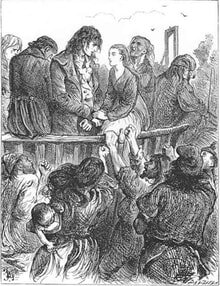 Illustration from "A Tale of Two Cities" by Dickens, Fred Barnard, 1870 This is a useful book for learning more about the historical setting of Austen's novels. Warren Roberts is an historian, not a literary critic, and he explains how the brief and fleeting references to current events in Austen's novels and private letters fit into the tide of history. He also speculates about how the dramatic events taking place around her shaped Austen's novels and her ideas. By "the French Revolution," Roberts means, more broadly, the effects of the French Revolution on English politics and society, the huge debate that opened up between conservatives who were alarmed by the French Revolution and progressives who cheered it on. On the evidence, he concludes that Austen was, broadly speaking, a Tory, a conservative. But he also points to where she shows feminist attitudes, if you think of feminism as being non-conservative.
Illustration from "A Tale of Two Cities" by Dickens, Fred Barnard, 1870 This is a useful book for learning more about the historical setting of Austen's novels. Warren Roberts is an historian, not a literary critic, and he explains how the brief and fleeting references to current events in Austen's novels and private letters fit into the tide of history. He also speculates about how the dramatic events taking place around her shaped Austen's novels and her ideas. By "the French Revolution," Roberts means, more broadly, the effects of the French Revolution on English politics and society, the huge debate that opened up between conservatives who were alarmed by the French Revolution and progressives who cheered it on. On the evidence, he concludes that Austen was, broadly speaking, a Tory, a conservative. But he also points to where she shows feminist attitudes, if you think of feminism as being non-conservative. As I have (ahem) frequently mentioned in this blog, I don't think Austen held radical views for her time. Isn't it interesting that scholars can sift and weigh the same evidence and come to completely opposite conclusions!
I think on the evidence, Roberts is right; Austen's a Tory in a Tory family and she's proud of her sailor brothers who served King and Country. She was not itching to send the aristocrats to the guillotine. But some issues, such as the abolition of slavery, crossed party lines, so a label can sometimes be limiting.
I think the most useful way to ask if Austen is making subtle and veiled allusions to the French Revolution (if this is really a question that exercises you) is to compare her books with the novels of her contemporaries who do bring politics more overtly into their novels. There are novelists who were much more outspoken, pro and con, about the French Revolution. For example, in Consequences or Adventures at Rraxal Castle (1796), young Lord Oswell comes back from a trip to France as a confirmed Republican. He addresses his noble father as "citizen." Oswell comes to a bad end. In this book, you don't have to read deep between the lines, as Roberts does with Austen. I think the question should be, "she was referencing the French Revolution compared to whom?"
John Sutherland, in Is Heathcliff a Murderer?: Great Puzzles in Nineteenth-Century Fiction, makes fun of Roberts. He says: "Roberts' line goes thus: "as is well known, Jane Austen never mentions the French Revolution. Therefore it must be a central preoccupation, and its silent pressure can be detected at almost every point in her narratives." Yes, it's all the more powerful for being completely unstated. T his is exactly what's going on today with "interrogating" Austen to unearth her views on slavery.
However, I agree that Roberts tends to read too much significance into little things. For example, when Henry Tilney scolds Catherine Morland for her gothic imagination, he says that the neighbourhood is full of voluntary spies. Roberts thinks that "spy" sentence jumps out of Henry Tilney's speech to Catherine. He thinks the reference to spies must make us think of government spies, and it must be quite a loaded word. Austen also uses the word in Mansfield Park. Mrs. Norris thought Susan was "a spy, and an intruder, and an indigent niece, and everything most odious." People used some words in contexts we wouldn't use today, including "plantation" (it meant, place that is planted), "slave" ("Your mother must have been quite a slave to your education") and "race" (Austen uses this word to describe the Morlands, instead of just "family."). So "plantation" and "race" don't have the same dark connotation for people in Austen's time that they do for us.
Roberts at least reads the "dead silence" passage in Mansfield Park correctly. Sir Thomas was not silent, it was his daughters. I think Roberts is solid in what he says about Mansfield Park. Similarly to Tony Tanner, he says the novel is about a traditional way of life that comes under threat because the people in charge of that traditional way of life (Sir Thomas and Lady Bertram) fail to guard it from dangerous interlopers (the Crawfords) who are alluring and attractive but dangerous and wrong. He also puts a charitable construction on whatever it was Sir Thomas was doing in Antigua, but it is all speculation in the end.
Jane Austen and the French Revolution is filled with useful historical information and cross-references to Austen's books and letters, and I think it's more accessible and readable for an introduction to the question of Austen's political views than Marilyn Butler's Jane Austen and the War of Ideas. I'd read this one first, then go on to Baker, if this topic is of interest to you. Jane Austen and the War of Ideas (1975) by Marilyn Butler
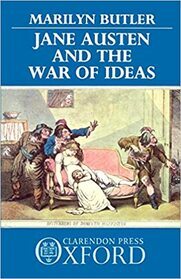 The depth and breadth of Marilyn Butler's knowledge of the long 18th century and the "War of ideas" between (broadly speaking) Jacobins and anti-Jacobins (pro and anti-French Revolution) is humbling. She shows how Austen's novels relate to the prevailing philosophical, moral and political debates of her time. She discusses dozens of other novels written during that period, and shows how novels were used to advocate for social reform, or to teach lessons about the perils of straying from conventional morality. Butler argues that of the two camps, Austen's novels "belong decisively to one class of partisan novels, the conservative..."
The depth and breadth of Marilyn Butler's knowledge of the long 18th century and the "War of ideas" between (broadly speaking) Jacobins and anti-Jacobins (pro and anti-French Revolution) is humbling. She shows how Austen's novels relate to the prevailing philosophical, moral and political debates of her time. She discusses dozens of other novels written during that period, and shows how novels were used to advocate for social reform, or to teach lessons about the perils of straying from conventional morality. Butler argues that of the two camps, Austen's novels "belong decisively to one class of partisan novels, the conservative..."Now that her rivals have dropped away into obscurity,* Austen and her work stands alone, and the modern reader does not have the benefit of understanding the milieu Austen grew up in, and the way her novels made a contribution to a national conversation. For example, many people wonder why it was such a big deal that young people would entertain themselves by putting on a play in a country house. Butler says of Lover's Vows, the play featured in Mansfield Park: "modern commentators sometimes underrate how notorious it was; how critics and satirists from the Anti-Jacobin (journal) had made it a byword for moral and social subversion."
Butler points out that Austen is not a revolutionary in terms of her ideas. She revolutionized the novel. "Her important innovations are technical and stylistic modifications within a clearly defined and accepted genre."
And while Austen's novels can be studied in the context of the "War of Ideas," they are also novels about people who go through crises and suffer and redeem themselves from their errors. The plots revolve around how Darcy overcomes his pride, Elizabeth overcomes her prejudice and Emma realizes she's been deluding herself and hurting other people.
I read this book in short doses with a highliter in my hand, and I think I'll refer back to it again and again to really absorb all the ideas and information presented.
*(Even the best known of them, like Burney and Radcliffe, have a small readership today compared to Austen). Previous post: A Spinster's Tale
Published on April 27, 2023 00:00
April 13, 2023
CMP#140 Caroline, the older heroine
 Clutching My Pearls is about Jane Austen and the times she lived in. The opinions are mine, but I don't claim originality.
Click here
for the first in the series. For more about other female writers of Austen's time, click the "Authoresses" tag in the Categories list to the right. CMP#140 The Spinster's Tale (1801), another never-reviewed book
Clutching My Pearls is about Jane Austen and the times she lived in. The opinions are mine, but I don't claim originality.
Click here
for the first in the series. For more about other female writers of Austen's time, click the "Authoresses" tag in the Categories list to the right. CMP#140 The Spinster's Tale (1801), another never-reviewed book
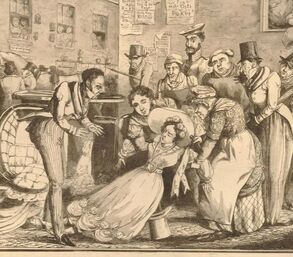 Carriage accidents and abductions Ann WIngrove's The Spinster’s Tale (1801) caught my eye because of the title. It received no reviews when it was published, so here is another of
my better-late-than-never
book reviews.
Carriage accidents and abductions Ann WIngrove's The Spinster’s Tale (1801) caught my eye because of the title. It received no reviews when it was published, so here is another of
my better-late-than-never
book reviews. The Spinster’s Tale is jam-packed with numerous plot-lines, backstories, and weddings. Plus a separate short gothic novel is stuck in the middle. There are so many characters, it’s difficult to remember them all.
Have you seen people in social media point out that Regency romances are unrealistic because there weren’t that many eligible young dukes and earls in Regency England? Well, that was the case from the get-go; the novels written at the time featured handsome, eligible lords by the bushel. There are half-a-dozen titled men running around in this novel, all of them in want of a wife, and they all marry girls of humbler birth.
One thing that sets this novel apart is that two of the major protagonists, and one minor, are older ladies. The titular spinster, Mrs. Caroline Herbert, ("Mrs." denotes an older lady, not necessarily a married one) is approaching 50. The kind and charitable Dowager Lady Brumpton has a fun back story where she dresses herself in boy’s clothes and climbs out a window after she’s abducted by a libertine. The minor character Miss Woodley is the impoverished authoress of the novel-within-a-novel Langbridge Fort. “Romance is not my forte,” she tells one of the young heroines, “but I had been told nothing would sell now, but the horrible, the wonderful, and the improbable.”
In addition to centering older females, The Spinster's Tale has other features which might be of interest to academics...
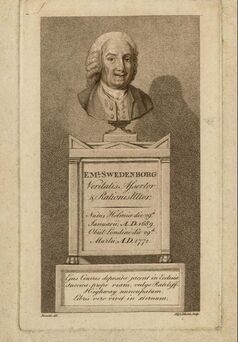 Emanuel Swedenborg (1688-1772), Courtesy British Museum Topics and themes in The Spinster's TaleThe author promotes the teachings of Emanuel Swedenborg, a Swedish scientist turned Christian mystic, who still has a following today. One of her characters can talk to angels, but her relatives throw her in an insane asylum.Two of the female characters wear men’s clothes for plot reasons, and so does one of the characters in the novel-within-a-novel. If you are interested in cross-dressing women in the long 18th century, this is your book.The admirable characters are always generous and thoughtful to the poor and they delight in useful schemes to improve life for working people. (Examples at the bottom of this post). For a Swedenborgian, works are important in addition to faith.Class is not much of a barrier for the various couples, nor are tyrannical parents. The men choose their wives for their sterling characters, beauty, and modesty. On the other hand, right after Fanny Mordaunt, orphaned daughter of a clergyman, accepts Lord Brumpton's proposal, she becomes her wealthy uncle's heiress, so equilibrium is preserved. There's also the story of a girl who elopes without parental consent and her husband turns out to be a rake and a gambler.Just about everybody finds love in this novel, including the spinster. A few characters die because of the sinful lives they’ve led, but others reform themselves and return to the paths of righteousness. The worst fates are reserved for people who are addicted to gaming and card-playing. “Mrs. Spencer was buried yesterday… this melancholy event has cast a temporary gloom over our social parties; but we shall soon forget her, whose irrational life made it impossible for any one to regret her loss.” Augusta becomes a courtesan and even though her titled lover marries her in the end, she still dies of venereal disease: "the consequence of her horrid connection with the debauched [manservant named] Duval which she thoughtlessly neglected, till it arrived to a most alarming state.” As for empire and colonialism, three times the author resorts to a West Indian fortune to enrich the characters when
money is needed
for plot purposes: “your kind heart will rejoice in hearing our son William is in health and settled in great business with a rich partner in Jamaica, and likely to make a fortune.” There is no mention of the contradiction between preaching morality and benevolence on the one hand, and enriching oneself through slavery. Inheriting a West Indian fortune is like winning the lottery.
Emanuel Swedenborg (1688-1772), Courtesy British Museum Topics and themes in The Spinster's TaleThe author promotes the teachings of Emanuel Swedenborg, a Swedish scientist turned Christian mystic, who still has a following today. One of her characters can talk to angels, but her relatives throw her in an insane asylum.Two of the female characters wear men’s clothes for plot reasons, and so does one of the characters in the novel-within-a-novel. If you are interested in cross-dressing women in the long 18th century, this is your book.The admirable characters are always generous and thoughtful to the poor and they delight in useful schemes to improve life for working people. (Examples at the bottom of this post). For a Swedenborgian, works are important in addition to faith.Class is not much of a barrier for the various couples, nor are tyrannical parents. The men choose their wives for their sterling characters, beauty, and modesty. On the other hand, right after Fanny Mordaunt, orphaned daughter of a clergyman, accepts Lord Brumpton's proposal, she becomes her wealthy uncle's heiress, so equilibrium is preserved. There's also the story of a girl who elopes without parental consent and her husband turns out to be a rake and a gambler.Just about everybody finds love in this novel, including the spinster. A few characters die because of the sinful lives they’ve led, but others reform themselves and return to the paths of righteousness. The worst fates are reserved for people who are addicted to gaming and card-playing. “Mrs. Spencer was buried yesterday… this melancholy event has cast a temporary gloom over our social parties; but we shall soon forget her, whose irrational life made it impossible for any one to regret her loss.” Augusta becomes a courtesan and even though her titled lover marries her in the end, she still dies of venereal disease: "the consequence of her horrid connection with the debauched [manservant named] Duval which she thoughtlessly neglected, till it arrived to a most alarming state.” As for empire and colonialism, three times the author resorts to a West Indian fortune to enrich the characters when
money is needed
for plot purposes: “your kind heart will rejoice in hearing our son William is in health and settled in great business with a rich partner in Jamaica, and likely to make a fortune.” There is no mention of the contradiction between preaching morality and benevolence on the one hand, and enriching oneself through slavery. Inheriting a West Indian fortune is like winning the lottery.
 Union Street, Bath Literary aspectsThe pace is swift. If Austen's favorite author, Samuel Richardson, was notoriously prolix, this author barely sketches out the plots of her novels. The narrative parts of the story read like they were written by a teenager: "Lady Brumpton... had long wished for a friend of her own age, with whom she might converse or correspond without any reserve.” She finds this friend in Mrs. Herbert: “'in short your appearance and manner proclaimed the gentlewoman, and I loved you as a sister the instant I found myself seated by your side. Your sentiments are so congenial to my own, that I feel for you the most perfect esteem…'”Just like the novel Melinda Harley the brisk action is interspersed with sermonettes, and characters often philosophize in their letters to each other. “I would have all young people marry, when they can do it properly; that is where there is a mutual affection, and a fortune on either or both sides united; to live as they have been brought up for I never knew a marriage happy (for any length of time) where a sufficiency was wanting, to support the couple in that style their birth and education required.”Coincidences abound. Whether a character is walking along the beach or in a garden in Portugal, or noticing a carriage with the family arms turning into an inn-yard, they're bound to run into some long-lost relation or be reunited with a lost love.Some plot points might sound familiar: Fanny Mordaunt's friend Harriet loves coquetting around Bath: “As to the Duke [of Mitcham], her vanity had represented his behavior in so flattering a manner, that she expected every day when he would offer to marry her; but till she was certain he was seriously attached to her, she did not like to give up so consequential a lover as Mr. Grant, or the tender attentions of the elegant Major Blandford.”Every now and then the author inflicts her poetry on us.The novel-within-a-novel Langbridge Fort is laugh-out-loud bad. I'm half-convinced it is a parody. I might share some excerpts sometime.The author wraps up the main love stories early in Volume III. The narrator remarks: “As many of my friends have remarked to me, how greatly they were disappointed to have a well-wrote novel or tale, end with the wedding-day of the principal hero or heroine of the piece—I shall beg leave in this my humble attempt to amuse and instruct, to vary from the general mode of my sister authors, by continuing mine for some time longer…” So, we skip ahead to the next generation; the daughter of Lord Brumpton and his wife Fanny. The Duke of Mitcham was in love with Fanny, so he waits 18 years and marries her daughter (for anyone looking examples of Marianne-Colonel Brandon-type pairings.) The story closes with the death of the dowager Lady Brumpton, at the age of 69.
Union Street, Bath Literary aspectsThe pace is swift. If Austen's favorite author, Samuel Richardson, was notoriously prolix, this author barely sketches out the plots of her novels. The narrative parts of the story read like they were written by a teenager: "Lady Brumpton... had long wished for a friend of her own age, with whom she might converse or correspond without any reserve.” She finds this friend in Mrs. Herbert: “'in short your appearance and manner proclaimed the gentlewoman, and I loved you as a sister the instant I found myself seated by your side. Your sentiments are so congenial to my own, that I feel for you the most perfect esteem…'”Just like the novel Melinda Harley the brisk action is interspersed with sermonettes, and characters often philosophize in their letters to each other. “I would have all young people marry, when they can do it properly; that is where there is a mutual affection, and a fortune on either or both sides united; to live as they have been brought up for I never knew a marriage happy (for any length of time) where a sufficiency was wanting, to support the couple in that style their birth and education required.”Coincidences abound. Whether a character is walking along the beach or in a garden in Portugal, or noticing a carriage with the family arms turning into an inn-yard, they're bound to run into some long-lost relation or be reunited with a lost love.Some plot points might sound familiar: Fanny Mordaunt's friend Harriet loves coquetting around Bath: “As to the Duke [of Mitcham], her vanity had represented his behavior in so flattering a manner, that she expected every day when he would offer to marry her; but till she was certain he was seriously attached to her, she did not like to give up so consequential a lover as Mr. Grant, or the tender attentions of the elegant Major Blandford.”Every now and then the author inflicts her poetry on us.The novel-within-a-novel Langbridge Fort is laugh-out-loud bad. I'm half-convinced it is a parody. I might share some excerpts sometime.The author wraps up the main love stories early in Volume III. The narrator remarks: “As many of my friends have remarked to me, how greatly they were disappointed to have a well-wrote novel or tale, end with the wedding-day of the principal hero or heroine of the piece—I shall beg leave in this my humble attempt to amuse and instruct, to vary from the general mode of my sister authors, by continuing mine for some time longer…” So, we skip ahead to the next generation; the daughter of Lord Brumpton and his wife Fanny. The Duke of Mitcham was in love with Fanny, so he waits 18 years and marries her daughter (for anyone looking examples of Marianne-Colonel Brandon-type pairings.) The story closes with the death of the dowager Lady Brumpton, at the age of 69.
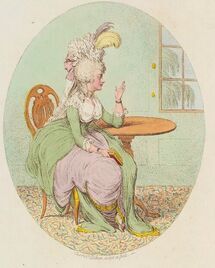 Frederica, Duchess of York (1767-1830), known for having very small feet
Noblesse Oblige
Frederica, Duchess of York (1767-1830), known for having very small feet
Noblesse Oblige
The Spinster’s Tale is dedicated by permission to Frederica, the Duchess of York. Like our modern-day Duchess of York, Frederica didn’t fit into the royal scene, had a reputation for being eccentric, and she separated from her husband. She was an animal lover and was known for being Lady Bountiful to the peasantry around her private estate, Oatlands. A recurring theme in The Spinster’s Tale is noblesse oblige; the privileged class have a duty to be good stewards of their their estates, and to take good care of the peasantry. Ann Wingrove has specific ideas about this which she shares in her novel: The Duke of Mitcham is generous to his honest steward, Mr. Wilmot, who, “with the entire approbation of his noble patron, built sixteen neat cottages, which was to be the habitation of female servants in the decline of life" but there was this interesting proviso, the servants had to "bring a certain assurance they had, during any part of their lives, lived six years in one place…”
Ann Wingrove was definitely of the "teach a man to fish" school of charity. “Two thousand pounds a year, was lent out to young industrious tradesmen, at three per cent, the interest of which was paid to six men, whose incomes would not enable them to live as their infirmities and advanced age required. Schools were opened for the poor of both sexes, where they were instructed in reading and writing, a few hours every day; and the other part passed in employments that would render them good labourers, servants, or mechanics, according as their strength or ability would permit.”
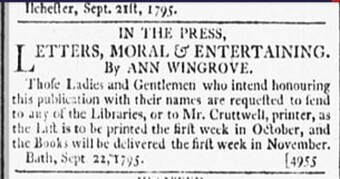 Bath Chronicle & Gazette, Sept. 24, 1795 About the authoress
Bath Chronicle & Gazette, Sept. 24, 1795 About the authoressAnn Wingrove (1745?-1824?) lived in Bath. She has one other attributed work, Letters, Moral & Entertaining (1795). This is a collection of conventional moral lessons for young people. Her "Letter to Delia" on the dangers of reading novels has been noticed by academics. The reviewers praised Letters for its “moral and religious tendencies," but they weren't struck by her writing talents. Two reviews mentioned she should stick to prose and stay away from inserting her poetry. “Mediocrity of talent, and strict purity of design [i.e. motive]…. are yet, in a certain species of composition, abundantly serviceable to the morals of mankind.”
The publication of Letters was funded by subscription, the 18th century equivalent of crowdfunding. Wingrove had over 300 subscribers for Letters, Moral & Entertaining, some of whom ordered multiple copies, a truly impressive accomplishment for a debut effort that was unremarkable both for its subject-matter and its literary merit.
How did an unknown 50-year-old woman garner so much support for her first book? If I have the correct Ann Wingrove, she was the daughter of Benjamin Wingrove, a prosperous Bath baker, maltser and brewer who was part of an extended family of Wingroves engaged in the same trades. They must have been prosperous enough to send their daughters to school and to attain to some gentility. It is possible that Ann and her sister ran their own academy because a "Miss A. Wingrove" taught pianoforte, the harp, singing, and dancing in the 1790’s in Bath. I like to think she was a cross-dressing eccentric who wore breeches to take the male part for her female customers, since she definitely had a thing about cross-dressing. At any rate, she must have met many people who spent time in Bath and wanted lessons for their daughters. Perhaps, too, she made connections through the Swedenborgian community in the United Kingdom. Their small congregations springing up around the country were probably exchanging letters at this time, even before they had established a Swedenborgian journal.
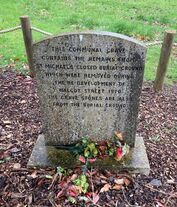 Communal grave marker, photo courtesy Haycombe cemetery. The reason I think I’ve found the correct birth and death dates for Ann Wingrove is that the list of subscribers in Letters, Moral & Entertaining includes some names which also appear in the will of Ann Wingrove of Bath, probated in 1824. Ann left some of her friends “five pounds for a ring” or ten pounds, or more: Mrs. Gregg, Mrs. Bingley, Mrs. Reynolds, Mrs. Wood, Mrs. Tugwell, and Mr. and Mrs. Thomas King of Walcot-House.
Communal grave marker, photo courtesy Haycombe cemetery. The reason I think I’ve found the correct birth and death dates for Ann Wingrove is that the list of subscribers in Letters, Moral & Entertaining includes some names which also appear in the will of Ann Wingrove of Bath, probated in 1824. Ann left some of her friends “five pounds for a ring” or ten pounds, or more: Mrs. Gregg, Mrs. Bingley, Mrs. Reynolds, Mrs. Wood, Mrs. Tugwell, and Mr. and Mrs. Thomas King of Walcot-House.Ann Wingrove's obituary, such as it was, only states that she died in her eightieth year. She might have outlived the people who knew about her books, and the editors of the Bath Chronicle, which posted the obituary, might not have known that 30 years before, her dancing academy was in the same building as their office at 9 Union Street.
Ann Wingrove was buried at St. Michael's burial ground but that cemetery was closed in 1967 and the remains were excavated and re-buried at Haycombe Cemetery.
The Spinster’s Tale was available at a circulating library on Milsom-Street, so it’s possible Jane Austen had a laugh over Langbridge Fort while she lived in Bath. She could also have opened Letters, Moral & Entertaining and picked out character names at random from Wingrove’s list of subscribers because Badeley, Bingley, Bennet, Coles, D’Arcy, Elton, Fitzwilliam, Ferrers, Ford, Smith, Ward, Watson, Hawkins, Jennings, and Palmer appear there.
Previous post: The Vicar of Wrexhill wrecks everything In the final book of my Mansfield Trilogy, my character William Gibson entertains little Betsy Price with a tale about a shipwrecked traveler and a Polynesian princess, told in the overblown style of a sentimental novel. For more about my novels, click here.
Published on April 13, 2023 00:00
April 6, 2023
CMP#139 Book Review: The Vicar of Wrexhill
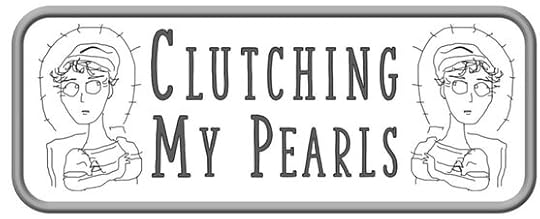 Clutching My Pearls is about Jane Austen and the times she lived in. Those who think we should speak of the past only to condemn it, but still want to rescue Jane Austen from the dustbin of history, have a bit of a dilemma on their hands. She wasn't a radical. Click here for the introduction to this blog. CMP#139: Frances Trollope's The Vicar of Wrexhill (1837)
Clutching My Pearls is about Jane Austen and the times she lived in. Those who think we should speak of the past only to condemn it, but still want to rescue Jane Austen from the dustbin of history, have a bit of a dilemma on their hands. She wasn't a radical. Click here for the introduction to this blog. CMP#139: Frances Trollope's The Vicar of Wrexhill (1837)
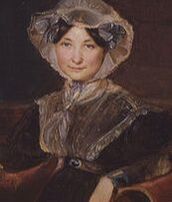 Frances Trollope (1779-1863) After wrapping up
my blog series
about unflattering portraits of Methodist ministers in 18th century novels, I came across The Vicar of Wrexhill by Frances Trollope. This 1832 novel is a bit outside the date range of novels I study, and the titular vicar is not a Methodist, but an evangelical in the Church of England. However, like the ministers in 18th-century novels, the evangelicals in this story are ranting fanatics or hypocrites and their followers are deluded fools.
Frances Trollope (1779-1863) After wrapping up
my blog series
about unflattering portraits of Methodist ministers in 18th century novels, I came across The Vicar of Wrexhill by Frances Trollope. This 1832 novel is a bit outside the date range of novels I study, and the titular vicar is not a Methodist, but an evangelical in the Church of England. However, like the ministers in 18th-century novels, the evangelicals in this story are ranting fanatics or hypocrites and their followers are deluded fools.Many people might pass over The Vicar of Wrexhill because its once-controversial subject matter--"High church" Anglicanism versus evangelism--would be of little interest in a post-Christian age. However, the story still offers snarky humour, heroines in peril, a cantankerous old married couple, and romance. The dialogue is sometimes stilted--it's hard to believe that 17-year-old girls actually speak with such complex sentences, but then I feel that way about Marianne Dashwood as well.
I liked the way Mrs. Trollope--like Jane Austen in Mansfield Park--designed her characters to come into conflict because of their differing personalities and world views. But for me, the biggest payoff was realizing I was reading about a 19th century moral panic, with so many parallels to the debates preoccupying society in our own times, specifically in the way people behaved--intimidating one another, condemning one another, freezing people out. Buckle up for a slow-motion train wreck in which you're not sure whether the characters are heading for ultimate tragedy or a happy ending... The Premise
Mr. Cartwright, the newly-appointed vicar for the lovely little parish of Wrexhill, is a handsome widower with two adult children. He devotes much of his time to making pastoral calls at the homes of attractive widows and praying with them in his flamboyant, emotional, style. He quickly fastens on the newly-bereaved Clara Mowbray, who has full command of her husband’s considerable fortune. (No doubt Mr. Mowbray was planning to revise his will once his son Charles came of age but dad drops dead the night after Charles’s 21st birthday.) Charles has two sisters, the angelic Helen and the poetry-loving Fanny. As well, the Mowbrays are guardians to Rosalind Torrington, a high-spirited Irish heiress who serves the role of saucy sidekick. She's the most engaging character in this novel.
Into this grieving family comes Rev. Cartwright, oozing sincerity and piety. Long before the terms were invented, Mrs. Trollope created a portrait of a narcissistic sociopath. The vicar flatters and fawns on 15-year-old Fanny, and she falls completely under his spell. Rosalind and Helen, on the other hand, are immediately repulsed by his manipulative tactics.
The first volume slowly and deliberately sets out the confluence of circumstances which puts the vicar in control of the Mowbray family.
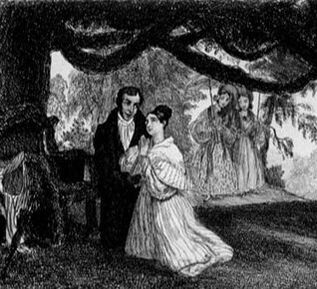 The creepy vicar gets 15-year-old Fanny alone: Mrs. Mowbray's neighbor, the baronet, opines: “Of every family into which this insidious and most anti-christian schism has crept... in nine instances out of ten, it has been the young girls who have been selected as the first objects of conversion, and then made the active means of spreading it afterwards.” The Widow Mowbray is weak and susceptible. The crusty old baronet-next-door refuses to help her negotiate her financial affairs, leaving the field clear for the vicar. Helen, as a
"picture of perfection" heroine,
can do little else but weep. Helen can’t bring herself to say she hates the vicar, but Rosalind certainly can and she engages in some spirited verbal duels with him. At the end of one quarrel, the minister asks to shake her hand. She declines: "But you must excuse my not accepting your proffered hand. It is but an idle and unmeaning ceremony perhaps, as things go; but the manner in which you now stretch forth your hand gives a sort of importance to it which would make it a species of falsehood in me to accept it. When it means any thing, it means cordial liking; and this, sir, I do not feel for you."
The creepy vicar gets 15-year-old Fanny alone: Mrs. Mowbray's neighbor, the baronet, opines: “Of every family into which this insidious and most anti-christian schism has crept... in nine instances out of ten, it has been the young girls who have been selected as the first objects of conversion, and then made the active means of spreading it afterwards.” The Widow Mowbray is weak and susceptible. The crusty old baronet-next-door refuses to help her negotiate her financial affairs, leaving the field clear for the vicar. Helen, as a
"picture of perfection" heroine,
can do little else but weep. Helen can’t bring herself to say she hates the vicar, but Rosalind certainly can and she engages in some spirited verbal duels with him. At the end of one quarrel, the minister asks to shake her hand. She declines: "But you must excuse my not accepting your proffered hand. It is but an idle and unmeaning ceremony perhaps, as things go; but the manner in which you now stretch forth your hand gives a sort of importance to it which would make it a species of falsehood in me to accept it. When it means any thing, it means cordial liking; and this, sir, I do not feel for you." Rosalind tries to warn Charles Mowbray, the son, but he is an optimist, rather like Edmund Bertram in Mansfield Park. He doesn’t see the danger until it is too late. And anyway, filial duty prevents both Charles and Helen from overruling their mother's bad decisions. One contemporary reviewer complained that another character, the vicar’s daughter Henrietta, could have spoken up and exposed her father as a fraud and a hypocrite, but instead she just drops gloomy hints: “[K]eep Mr. Cartwright as far distant from all you love as you can. Mistrust him yourself, and teach all others to mistrust him.—And now, never attempt to renew this conversation.” Awakening his flock
Mr. Cartwright claims to be one of the “elect,” guaranteed a place in heaven. "Every object, animate or inanimate, furnished him a theme; and let him begin from what point he would, (unless in the presence of noble or influential personages to whom he believed it would be distasteful,) he never failed to bring the conversation round to the subject of regeneration and grace, the blessed hopes of himself and his sect, and the assured damnation of all the rest of the world." His words fall on willing ears; one female acolyte declares: "'My life has been passed in a manner so widely different from what I am sure it will be in future, that I feel as if I were awakened to a new existence!"
The vicar replies, "'The great object of my hopes is, and will ever be, to lead my beloved flock to sweet and safe pastures.—And for you,' he added, in a voice so low, that she rather felt than heard his words, 'what is there I would not do?'"
When anyone challenges him, he plays the damnation card on them: "May your unthinking youth, my dear young lady," [he says to Rosalind], "plead before the God of mercy in mitigation of the wrath which such sentiments are calculated to draw down!" Pretty soon, the entire village is divided between those who are "regenerated," (ie "born again") and those who are not. The vicar rewards his followers and punishes the holdouts. The schoolmaster of Wrexhill is “cancelled,” you might say, because he refuses to bring his pupils to Mr. Cartwright’s evening prayer meetings. His objection is not so much doctrinal but that young people and servants can't be entrusted to attend ecstatic evening gatherings which can lead to unbridled passion and rumpty-tumpty in the bushes. {This puts me in mind of what my mother recalls about travelling gospel tent shows in Southern Illinois in her girlhood]. Anyway, the schoolmaster is ruined and ends up in debtor’s prison.
Sweet-tempered Mrs. Richards is condemned and lectured by her daughters: “She is breaking her heart because... her daughters have thought proper to... tell her very coolly, upon all occasions, that she is doomed to everlasting perdition, and that their only chance of escape is never more to give obedience or even attention to any word she can utter."
No-one seems to notice that the vicar has failed to convert his own children. His sarcastic son James escapes to become an actor, while Henrietta, repulsed by his version of Christianity, becomes an atheist--a revelation intended to shock the reader.
There are some dryly comic passages, as when the ladies organize a fund-raising fair for a mission to Africa. One contemporary reviewer compared Mrs. Trollope to Austen in her “slyness and discrimination” in portraying human foibles.
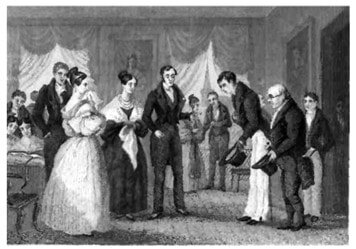 The Vicar triumphantly changes the name of the estate from "Mowbray Hall to "Cartwright Hall" and receives visitors Spoiler time
The Vicar triumphantly changes the name of the estate from "Mowbray Hall to "Cartwright Hall" and receives visitors Spoiler timeThings go from bad to worse for the siblings Charles, Helen and Fanny when Mrs. Mowbray marries the vicar. She tells her family and her servants: “his commands must on all occasions supersede those of every other person. I trust you will all show yourselves sensible of the inestimable blessing I have bestowed upon you in thus giving you a master who can lead you unto everlasting life.” A horrified Fanny realizes that the man she idolized was using her, but she's still terrified of spending eternity in a lake of fire. She sinks into near-madness.
Mrs. Mowbray, now Mrs. Cartwright, is soon pregnant with Rev. Cartwright's child, so the prospects for the Mowbray siblings ever seeing a penny of their inheritance are looking slim. The minister clamps down on his control of the entire household. Colonel Harrington, the son of the crusty old baronet-next-door, sends a marriage proposal to Helen by mail, but Mr. Cartwright burns the letter before she sees it. He intends to force Helen to marry his repulsive cousin Stephen Corbold. The dramatic high point of the novel comes when the two men connive to get Helen alone with Mr. Corbold. The implication is that he will compromise her by sexually assaulting her, and then she will have to marry him. I will say that Helen, the insipid heroine, really redeems herself in this scene. I thought Mrs. Trollope would bring her sweetheart to her rescue in the nick of time, but Helen rescues herself. Instead of fainting, she throws a bottle of “spirits of hartshorn” (aka ammonia) into the creep’s face and makes her escape.
Meanwhile, Rosalind devotes herself to reclaiming Henrietta from atheism as she sinks into the grave. The whole story appears to be heading toward complete tragedy but thanks to some dying revelations from Henrietta, her dad is exposed as a philanderer. It seems one of his parishioners left town to go visit her aunt (as folks used to say), because her religious raptures with the vicar led to something more physical. When Mrs. Cartwright learns about her husband’s love child, the spell he held over her is broken. But, by the logic of the 19th century novel, this doesn’t mean that the vicar must die, it means Mrs. Cartwright and her innocent infant child must die, and they do. At the reading of the will, we learn that although Mrs. Cartwright was virtually kept a prisoner by the vicar, she managed to secretly change her will to reinstate her three children. Happy Ending
Fanny recovers from her obsession with death and salvation and regains her mental equilibrium, Charles, no longer penniless, is free to propose to Rosalind, while Helen marries Colonel Harrington. The vicar leaves town with his still-loyal followers and the remaining villagers resume their old lives. "[T]he pretty village of Wrexhill once more became happy and gay, and the memory of their serious epidemic rendered its inhabitants the most orderly, peaceable, and orthodox population in the whole country.”
Even if you are not conversant with, or could care less about, the battling doctrines of "faith" versus "works" in The Vicar of Wrexhill, you might be interested in Mrs. Trollope's portrayal of a power-hungry person who exploits an uncompromising dogma which splits families and friends apart. This phenomenon, I do believe, is entirely relatable to modern times.
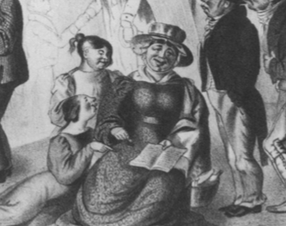 Satiric 1832 American cartoon of Frances Trollope with her family in Cincinnati (detail) About the Authoress
Satiric 1832 American cartoon of Frances Trollope with her family in Cincinnati (detail) About the AuthoressFrances Trollope (1779-1863) is the mother of the better-known novelist Anthony Trollope. Space prevents me from recapping her full biography in this post, but she had an interesting and difficult life and published 40 books in her twenty-year career. As the Victorian Web explains: "Although born in 1779, just four years after Jane Austen, she started writing long after Austen's death, when she was over fifty. Published during the Victorian era, her novels mix an eighteenth century sensibility with a reforming zeal common to the nineteenth century. Her work varies greatly in subject matter, genre, and merit; she quickly published novels that could have benefited from extensive editing."
Frances Trollope's first book was a caustic commentary on America which sold well but of course angered Americans. When she turned her scrutiny to the evangelical movement in England she roused considerable ire at home. An anonymous reviewer for Fraser’s magazine said Mrs. Trollope: “had much better have remained home, pudding-making or stocking-mending, than have meddled with matters which she understands so ill.” (Fuller quote below)
When The Vicar of Wrexhill was published, it was thought that the character of the vicar was based on a real evangelical minister, John William Cunningham, whom Frances Trollope knew and disliked. I think she is not lampooning one man but an entire religious movement. But ewwww, just suppose Rev. Cunningham really spoke to the teenage girls in his parish the way that Rev. Cartwright speaks to Fanny in the novel! "How sweetly does youth, when blessed with such a cheek and eye as yours, Miss Fanny, accord with the fresh morning of such a day as this!—I feel," [Rev. Cartwright] added taking her hand and looking in her blushing face, "that my soul never offers adoration more worthy of my Maker than when inspired by intercourse with such a being as you!"
"Oh! Mr. Cartwright!" cried Fanny, avoiding his glance by fixing her beautiful eyes upon the ground.
"My dearest child! fear not to look at me—fear not to meet the eye of a friend, who would watch over you, Fanny, as the minister of Heaven should watch over that which is best and fairest, to make and keep it holy. Let me have that innocent heart in my keeping, my dearest child, and all that is idle, light, and vain shall be banished thence, while heavenward thoughts and holy musings shall take its place. Have you essayed to hymn the praises of your God, Fanny, since we parted yesterday?" One of Mrs. Trollope's friends, Henrietta Skerrett, had a miserable experience with evangelism, though I don't know the details. But surely this is why the vicar's daughter in the book was named Henrietta.
Mrs. Trollope also wrote a pro-abolition novel and a novel exposing the harsh life of children who worked in factories. In other words she was much more outspoken than Jane Austen. Fraser's Magazine, January 1838
"With a keen eye, a very sharp tongue, a firm belief, doubtless, in the high church doctrines, and a decent reputation from the authorship of half-a-dozen novels, or other light works, Mrs. Trollope determined on no less an undertaking than to be the champion of oppressed Orthodoxy. These are feeble arms for one who would engage in such a contest, but our fair Mrs. Trollope trusted entirely in her own skill, and the weapon with which she proposed to combat a strong party is no more nor less than this novel of The Vicar of Wrexhill. It is a great pity that the heroine ever set forth on such a foolish errand; she has only harmed herself and her cause (as a bad advocate always will), and had much better have remained home, pudding-making or stocking-mending, than have meddled with matters which she understands so ill.
"There can be little doubt as to the cleverness of this novel, but, coming from a women's pen, it is most odiously and disgustingly indecent. As a party attack [on the Whigs], it is an entire failure; and as a representation of a very large portion of English Christians, a shameful and wicked slander."
Previous post: Guest post: Jane Austen, anti-capitalist
 In the second novel of my Mansfield Trilogy, an unctuous clergyman, the Reverend Edifice, becomes interested in Fanny Price, especially because he thinks she will receive a handsome bequest when her friend Mrs. Butters dies. My story also features Lord and Lady Delingpole, an older couple who quarrel a lot but ultimately feel a lot of respect for each other, rather like the baronet and his wife in Trollope's story. For more about my books, click here.
In the second novel of my Mansfield Trilogy, an unctuous clergyman, the Reverend Edifice, becomes interested in Fanny Price, especially because he thinks she will receive a handsome bequest when her friend Mrs. Butters dies. My story also features Lord and Lady Delingpole, an older couple who quarrel a lot but ultimately feel a lot of respect for each other, rather like the baronet and his wife in Trollope's story. For more about my books, click here.
Published on April 06, 2023 00:00
March 31, 2023
CMP#138 Guest Post: Jane Austen, Anti-Capitalist
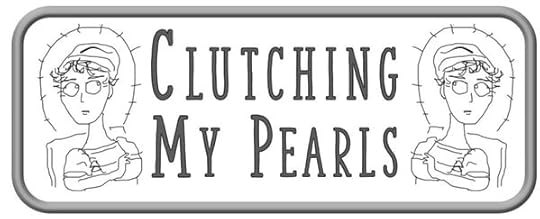 It's always a pleasure to encourage young scholars, so I'm pleased to welcome Lura Amandan to "Clutching My Pearls" this week. Ms. Amandan is a postgraduate student at the University of Reinlegen in Germany. Her doctoral thesis is focused on early critiques of capitalism in European literature, and with the kind permission of her faculty advisors, I am sharing an excerpt from her truly groundbreaking work-in-progress concerning Jane Austen and capitalism. My six questions for Austen scholars post is here. Jane Austen, "A Marxist Before Marx"
It's always a pleasure to encourage young scholars, so I'm pleased to welcome Lura Amandan to "Clutching My Pearls" this week. Ms. Amandan is a postgraduate student at the University of Reinlegen in Germany. Her doctoral thesis is focused on early critiques of capitalism in European literature, and with the kind permission of her faculty advisors, I am sharing an excerpt from her truly groundbreaking work-in-progress concerning Jane Austen and capitalism. My six questions for Austen scholars post is here. Jane Austen, "A Marxist Before Marx"
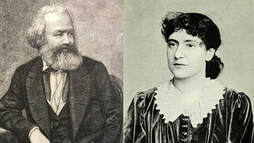 Karl Marx and his daughter Eleanor: was her name inspired by Austen? (Source: British Library) As many scholars of Austen have long pointed out, Jane Austen intended to use Sanditon to explore the social and moral consequences of capitalism. Sadly, Austen laid the manuscript aside during her final illness. Interrogating Austen through a critical lens reveals that she was a committed anti-capitalist who was determined to fight back in the only way she could--through her pen.
Karl Marx and his daughter Eleanor: was her name inspired by Austen? (Source: British Library) As many scholars of Austen have long pointed out, Jane Austen intended to use Sanditon to explore the social and moral consequences of capitalism. Sadly, Austen laid the manuscript aside during her final illness. Interrogating Austen through a critical lens reveals that she was a committed anti-capitalist who was determined to fight back in the only way she could--through her pen.I am not referring to Austen's well-known portrayals of the landed gentry and the lesser nobility, but rather, her subtle attacks on the pernicious influence of consumerism. To a startling extent, the buying and selling of things and the rise of the urban bourgeoisie forms a backdrop to her so-called marriage plot novels. Scholar David Daiches called Austen "a Marxist before Marx."
It is no exaggeration to say that Austen shows us whether a character is good or bad by their reaction to consumerism. Two of Austen’s heroines never step inside a store--Elizabeth Bennet and Fanny Price. And, significantly, the heroines who do go shopping always live to regret the experience. It is only the fops and fools who like to shop, as we will see. Austen’s message could not be clearer: Capitalism is the root of all evil. Let’s critically take the novels one by one...
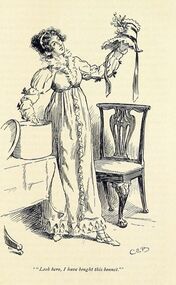 CE Brock illustration, Lydia and her bonnet In Sense and Sensibility, Mrs. Jennings invites Elinor and Marianne Dashwood to go shopping with her after they reach London. Marianne, perhaps the most highly principled character in all of Austen, refuses to go at first. Whenever she is in a store, she is “restless and dissatisfied” and refuses to give her opinion on any of the “articles of purchase,” that is, the products made by the exploitation of the workers. Later, Austen lets us know what a worthless human being Robert Ferrars is by telling us he wastes his time inspecting and selecting a toothpick case... Eleanor and Marianne can't wait to get out of Gray's jewelry store. In Pride and Prejudice, long before Lydia runs away with Wickham, she stands condemned in Austen’s eyes (and ours) for wasting her money on an ugly bonnet. Her remark: “I do not think it is very pretty; but I thought I might as well buy it as not” is a perfect encapsulation of the emptiness of consumerism.
CE Brock illustration, Lydia and her bonnet In Sense and Sensibility, Mrs. Jennings invites Elinor and Marianne Dashwood to go shopping with her after they reach London. Marianne, perhaps the most highly principled character in all of Austen, refuses to go at first. Whenever she is in a store, she is “restless and dissatisfied” and refuses to give her opinion on any of the “articles of purchase,” that is, the products made by the exploitation of the workers. Later, Austen lets us know what a worthless human being Robert Ferrars is by telling us he wastes his time inspecting and selecting a toothpick case... Eleanor and Marianne can't wait to get out of Gray's jewelry store. In Pride and Prejudice, long before Lydia runs away with Wickham, she stands condemned in Austen’s eyes (and ours) for wasting her money on an ugly bonnet. Her remark: “I do not think it is very pretty; but I thought I might as well buy it as not” is a perfect encapsulation of the emptiness of consumerism.Fanny Price of Mansfield Park is the most misunderstood and maligned of Austen's heroines today. But it is long past time for a critical reappraisal, starting with the fact that Fanny never goes near a store. This should put an end to the endless debates in Austen circles about Fanny Price—she is in fact a courageous anti-capitalist. Even when she visits her family in Portsmouth and is hungry after dinner, she sends her brothers out to buy biscuits and buns for her, rather than go into a shop herself.
Edmund Bertram commissions his older brother Tom to buy a piece of jewelry for Fanny while Tom is in London, but Mary Crawford is the truly admirable character who recycles a superfluous necklace that she doesn't wear very much, and gifts it to Fanny.
In Emma, it is the foolish air-headed Harriet Smith who admires every shiny item at Ford’s store. Just as Mrs. Palmer aggravates Elinor in Sense and Sensibility because her “eye was caught by every thing pretty, expensive, or new; who was wild to buy all, [and] could determine on none,” Harriet cannot make up her mind about anything and wants to buy everything when she shops at Ford's. When Mrs. Weston and Frank Churchill happen to walk by, Emma is embarrassed to be seen in the store and she is quick to let them know “I am here on no business of my own." She is still at Ford's trying to hurry Harriet along with her purchases, when she discovers she is trapped--Miss Bates comes in and begs her to come and listen to Jane Fairfax's new pianoforte. There is no escaping the disagreeable duty, and it wouldn't have happened unless Harriet had been lingering over figured muslin and yellow ribbons. But even though she has to pay an unwanted social call, Emma feels relief when "they did at last move out of the shop." Even listening to Miss Bates prattle on about nothing is preferable to being at Ford's.
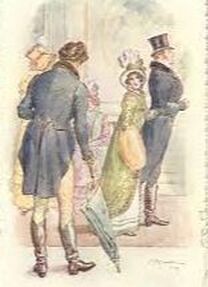 At Molland's on Milsom Street Ford's is a uniquely sinister representation of capitalism in Austen. A critical examination of the plot reveals that Mr. and Mrs. Ford exercise a monopoly over all the citizens of Highbury. As Frank Churchill puts it, Ford's is "the very shop that every body attends every day of their lives, as my father informs me." Unhappy about the social pressure to engage in mindless consumerism, Frank complains: "to be a true citizen of Highbury. I must buy something at Ford’s." In this clever way Austen softens our perception of Frank Churchill, and we realize, as even Mr. Knightley acknowledges later, that he is "a very good sort of fellow."
At Molland's on Milsom Street Ford's is a uniquely sinister representation of capitalism in Austen. A critical examination of the plot reveals that Mr. and Mrs. Ford exercise a monopoly over all the citizens of Highbury. As Frank Churchill puts it, Ford's is "the very shop that every body attends every day of their lives, as my father informs me." Unhappy about the social pressure to engage in mindless consumerism, Frank complains: "to be a true citizen of Highbury. I must buy something at Ford’s." In this clever way Austen softens our perception of Frank Churchill, and we realize, as even Mr. Knightley acknowledges later, that he is "a very good sort of fellow."In Persuasion, Molland’s is the setting for an encounter between Anne, Captain Wentworth and Mr. Elliot which leaves Captain Wentworth with the notion that Mr. Elliot and Anne will be married. Austen could have placed this unhappy turn of events in a park, or at the Pump Room, but—significantly—she chose a shop. While Anne is stuck at Molland's, waiting for Mr. Eliot's return, there is not a single mention of her looking around at whatever is on sale in the store. She looks outside and up and down the sidewalk, never around her. She can't wait to get out of there: "She now felt a great inclination to go to the outer door." Who does have some kind of shopping errand in this scene? The two villains of the piece, Mr. Elliot and Mrs. Clay.
In another subtle and deft touch in Persuasion, Anne encounters Admiral Croft as he stands outside a shop, contemptuously rejecting the paintings for sale within. This stamps him as one of Austen's upright and good characters.
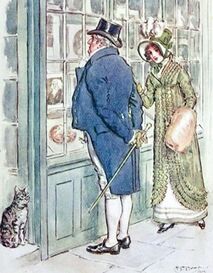 Admiral Croft and Anne Wentworth Catherine Morland has no choice but to go to shop after shop with Mrs. Allen after they arrive in Bath in Northanger Abbey. Some analysts of this novel point to the difference in tone between the scenes set in Bath and the scenes set at the Tilney’s home, Northanger Abbey. But the real reason for the difference has been right beneath our noses all along—Bath is filled with shops, it is a capitalist hell-hole and Catherine has one disagreeable experience after another so long as she is there. Isabella Thorpe is a selfish, shallow, character who--no surprise--wants to buy even more gaudy fashions than she can possibly afford: "Do you know," she tells Catherine, "I saw the prettiest hat you can imagine, in a shop window in Milsom Street just now—very like yours, only with coquelicot ribbons instead of green; I quite longed for it."
Admiral Croft and Anne Wentworth Catherine Morland has no choice but to go to shop after shop with Mrs. Allen after they arrive in Bath in Northanger Abbey. Some analysts of this novel point to the difference in tone between the scenes set in Bath and the scenes set at the Tilney’s home, Northanger Abbey. But the real reason for the difference has been right beneath our noses all along—Bath is filled with shops, it is a capitalist hell-hole and Catherine has one disagreeable experience after another so long as she is there. Isabella Thorpe is a selfish, shallow, character who--no surprise--wants to buy even more gaudy fashions than she can possibly afford: "Do you know," she tells Catherine, "I saw the prettiest hat you can imagine, in a shop window in Milsom Street just now—very like yours, only with coquelicot ribbons instead of green; I quite longed for it."By now it should be no surprise to realize that Austen marks out General Tilney as a villain by showing him as a man who is always boasting about his possessions, such as his breakfast set of Staffordshire china. He tells Catherine that he “thought it right to encourage the manufacture of his country.” Catherine, young and naïve, is absolved by Austen from complicity in all of this. While Henry and his sister Eleanor understand that their father is all for the exploitation of the proletariat, “Catherine was probably the only one of the party who did not understand him.”
Was this bold and radical critique included in the original version of the novel, titled Susan, or was it a later interpolation after Austen’s brother retrieved the unpublished manuscript? Did Austen, in fact, add this more daring scene shortly before her death? We can only speculate, but Austen appears to have grown more radical and outspoken as she matured as a writer.
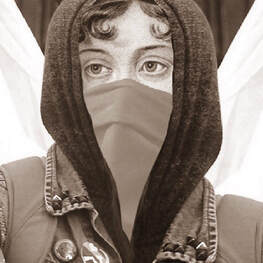 In Sanditon we critically encounter the most open, the most radical and rebellious outcry against capitalism when Charlotte Heywood visits the new sea-side resort as the guest of the Parkers. Her father, a wise farmer, is against these new watering places: "Every five years, one hears of some new place or other starting up by the sea and growing the fashion. How they can half of them be filled is the wonder! Where people can be found with money and time to go to them! Bad things for a country--sure to raise the price of provisions and make the poor good for nothing." As Charlotte discovers when she visits Sanditon, the circulating library is filled with “all the useless things in the world that could not be done without.”
In Sanditon we critically encounter the most open, the most radical and rebellious outcry against capitalism when Charlotte Heywood visits the new sea-side resort as the guest of the Parkers. Her father, a wise farmer, is against these new watering places: "Every five years, one hears of some new place or other starting up by the sea and growing the fashion. How they can half of them be filled is the wonder! Where people can be found with money and time to go to them! Bad things for a country--sure to raise the price of provisions and make the poor good for nothing." As Charlotte discovers when she visits Sanditon, the circulating library is filled with “all the useless things in the world that could not be done without.”Critically tracing the development of Austen's anti-capitalist thought through all six of her novels shows that Sanditon was intended to be the culmination of her efforts. Capitalism rears its ugly head, although subtly, in all her works.
To say that Austen is deeply mistrustful of the future of places like Sanditon is an understatement. The looming catastrophe of the new capitalist order hangs over the book like an ominous shadow. There is no doubt about it--Austen was on the right side of history, she wanted to smash capitalism, and her opinions accord completely with my own views. Acknowledgements: My thanks to the Scherzbetrug Corporation, LLC, for their generous grant which enabled me to study at the British Library (in the footsteps of Karl Marx!) in the preparation of my thesis. Thanks to my parents for their support. Previous guest posts are here and here. Previous post: Book Review: The History of Melinda Harley
Published on March 31, 2023 00:00
March 27, 2023
CMP#137 Melinda, the Prim and Proper Heroine
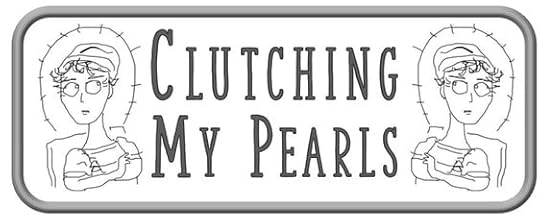 If you want superb writing and amazing delineations of character, you can't top Jane Austen. If you want a female author of the long 18th century who discusses imperialism, the status of women, race and class, there are plenty of writers who were more explicit on these issues. I've been featuring some on this blog. Today, meet "M.E." CMP#137 Book review: The History of Melinda Harley
If you want superb writing and amazing delineations of character, you can't top Jane Austen. If you want a female author of the long 18th century who discusses imperialism, the status of women, race and class, there are plenty of writers who were more explicit on these issues. I've been featuring some on this blog. Today, meet "M.E." CMP#137 Book review: The History of Melinda Harley
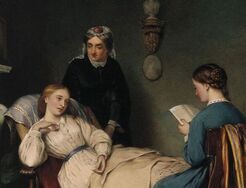 Drifting off with a book “Miss Melinda Harley, of Yorkshire, may pass well enough for a country body; but really her history was not worth bringing up to town.”
Drifting off with a book “Miss Melinda Harley, of Yorkshire, may pass well enough for a country body; but really her history was not worth bringing up to town.”So goes one of several dismissive contemporary reviews for The History of Melinda Harley, Yorkshire (1777). The Westminster Review gave it only one sentence: “the history of an ephemera, that is born and dies on the same day.”
Another reviewer joked: “It is the general character of many romances, that they are good for nothing; but we must except the History of Melinda Harley from this censure, for we can affirm, from our own experience, that it is admirably calculated—to procure sleep.”
Ouch, ouch, and ouch, anonymous authoress! I feel for you. Yes, the plot is slight, the characters are wooden, and the detail is sparse, but I became quite interested in the wide variety of moralizing comments that Melinda Harley trades with her BFF Amanda Beaufort while Melinda is away visiting with family friends. The girls share their thoughts on the folly of dueling, the pending loss of the American colonies, and the consolations of religion.
Some of their exchanges are the sort Mary Bennet would approve of: “Most of our wants are artificial, and his happiness is much better assured who has learned to contract his desires.” “It is a great inducement to the exercise of benevolence, to view human nature in a fair light, and to put the best construction on one anothers’ actions.” Some remarks are explicitly political or feminist in tone.
Some of these epistolary sermonettes touch on situations with similarities to Austen novels. I am not saying Austen drew from this novel, rather, that both writers drew from topics and situations prevalent at the time. I will share a few examples but I won’t point out which passage in which Austen novel they remind me of. If you’re not a Janeite, it won’t be relevant to you, and if you are a Janeite, you don’t need me to tell you...
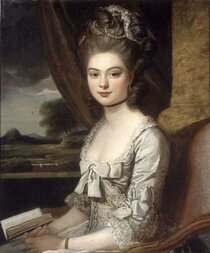 Miss Hill, Nathaniel Holland, 1770 Melinda to Amanda, Amanda to Melinda, but it doesn't really matter which is which
Miss Hill, Nathaniel Holland, 1770 Melinda to Amanda, Amanda to Melinda, but it doesn't really matter which is which“I know of nothing more agreeable than to be in company with well bred people, who are always endeavouring to please and to gain the favourable opinion of one another… True politeness, then, must consist in an easy stream of conversation… and in pleasing without flattery, or contradicting without provoking.”
“External accomplishments, such as dancing, dressing, music, etc, are no doubt necessary in a certain degree, but should this be [a girl's] only care, while little or no pains is taken to cultivate the mind… surely we should endeavour to qualify ourselves for being reasonable companions…”
“Your notions of female education are very just, and I still hope to see a more rational system introduced and encouraged by the men. It is generally allowed that nature has done her part, and that we even excel the men in fancy and quickness of apprehension. We should surely endeavour, then, to wipe off that aspersion thrown upon our sex, by a late celebrated writer, who avers that no flattery is too gross for us, and that he never knew a woman who could either reason or act consequentially for 24 hours together.”
In addition to speaking up for the capacity of women to be rational, Amanda declares that "marriage is not essential to happiness." Speaking of a neighbour who rashly married a bad-tempered man, Amanda opines: “Thus, poor woman, does she reap the fruits of her own folly and obstinacy. She was indeed past the prime of youth, but surely marriage is not essential to happiness; and I know nothing that can render a woman more despicable than this notion of marriage being absolutely necessary; besides, it is the very way to prevent it, and experience shows, that many women have passed through life in a very happy, easy, and respectable manner, without entering into the matrimonial state.”
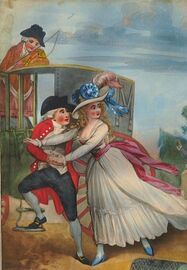 Julia's Folly
Julia's FollyAs a side incident, Amanda tells Melinda that their neighbour Julia Finchley “went off in a post chaise” with a dashing army captain while her family was at church: “The poor old father set off on his return from church, in quest of his daughter, but returned home the next day, having learned from some of the country people that the seducer had provided himself with four horses to his chaise, and was seen driving fast away on the road to London, where probably the poor victim will soon be left to shame and misery, as I hear that the Captain is ordered for America in the spring.”
Melinda responds: No doubt the captain “has promised to marry her in London… though I am by no means disposed to palliate his conduct, yet I am afraid that she has been deficient in that modest reserve and retiring delicacy, which rather shuns the public eye, and keeps such men at a due distance. Indeed I always thought her too brisk and forward…”
Melinda also blames-- yes, novels! —for Julia’s downfall: “I have likewise been often surprised at her parents too great indulgence, in allowing her indiscriminate fondness for novels and romances to be so much gratified. Instead of endeavouring to gain useful knowledge, she always delighted in that kind of reading which warms the fancy, and softens the heart." Many a novel and a conduct-book laid out the rules for how young ladies should deport themselves. In this novel, it is the heroine herself who lays it all out in discussing Julia Finchley: "She was too often gauding [gadding] abroad... instead of conversing with a dignified modesty, her behaviour was too unreserved, which, however innocent in the main, probably at first might encourage her seducer.” “You will think, no doubt, that I have got into a very serious moralizing strain…”
Melinda then turns to what Julia ought to have done, and implicilty, what she herself does: “As there is a levity and dissipation in the present age, there is surely nothing so proper to check this as a proper sense of religion, one of the chief securities for female virtue; and without which we are apt to contract a hard and masculine temper, the most disgusting of all our faults, to men of taste and sensibility. Much depends, likewise, on the proper management of our time, which is general should be divided betwixt reading, working, walking, and genteel amusements; early rising, due exercise, and proper amusements are necessary to preserve health and good humour, while works of taste and fancy, with the assistance of useful books, infuse habits of virtue, and a due sense of decorum.” When Melinda visits London with her friends, the repentant Julia gets in touch with her. Melinda finds her in a boarding-house, brought to death’s door by remorse. (Notice that here a girl of good reputation goes to visit a fallen girl, and if she had a chaperone with her, it is not mentioned.) “I begged her to take comfort, and insisted on her drinking a glass of wine to support her spirits, until I sent for a physician. Alas, said she, your kindness is in vain, death now can only be my physician…Still, if I could see my father, said she, and obtain his forgiveness, I should be perfectly resigned; hoping that my example may prove of lasting benefit to many others, and that providence has permitted this [ie her seduction and death] for wise ends.” Melinda arranges for dad to rush up from the country for a touching deathbed scene, necessary for the salvation of the guilty Julia's soul. Later Amanda explains how Mr. Finchley reforms his household when he returns to Yorkshire: “[T]he good man is determined, if possible, to convert the present misfortune to the future good of his family; he has made a diligent search after all the foolish plays and novels in the house, and yesterday he committed them all to the flames; but, in honour to Richardson, Fielding and Dr. Smollet, has preserved Pamela, Clarissa, Tom Jones, Humphrey Clinker, and a few others excepted. All the family who are in health, are to rise at six in summer, and seven in winter. Every morning one of the girls, by turns, reads aloud a paper of the Spectator; and, while the rest are at work in the parlour, another reads aloud, an hour before dinner, Hume’s History of England. Before supper another paper of the Spectator or Guardian is read again, except on Sunday, when one of Fordyce’s sermons to young women is then preferred.” This novel-burning and novel-condemnation takes place in the pages of a novel. Austen was not exaggerating in Northanger Abbey when she wrote of how heroines of novels disdain novels.
And yet, the critics laughed at Melinda Harley and called it boring and insubstantial. There's no pleasing some people...
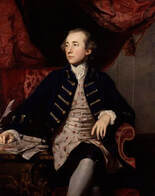 Warren Hastings by Reynolds East Indian Depredations
Warren Hastings by Reynolds East Indian DepredationsThe topic of empire arises in Melinda Harley when the heroine meets another houseguest, “a Mr. Lanton, who is a relation of Sir Robert’s and lately returned from the East Indies, with a genteel easy fortune." Melinda specifies that his wealth was "gained at no expense of character, guiltless of rapine and depredation; he is cheerful, frank, and open, gives a fine character of Mr. Haskins the present governor, and says that he [Haskins} has done all that a man could do to re-establish the [East India] Company’s finances under proper management and economy; and at the same time to protect the poor natives from being any longer oppressed by their cruel task-masters, which had occasioned the depopulation of a great part of that once happy country… What a reproach to Englishmen, so jealous of their own liberties, thus to have made so wanton an use of their power over the defenceless inhabitants!”
Melinda might be referring, among other things, to the Great Bengal famine of 1770 , in which poor weather conditions and bad harvests were exacerbated by the East India Company's collection of taxes, and purchases of food for their own army, and their failure to mitigate the sufferings of the Indians.
I couldn't find a "Mr. Haskins" listed as a governor or director of the East India Company. The novel has a few typos--for example, "Mr. Ash" is first introduced as "Mr. Ask," so perhaps this name is a printer's misreading of "Hastings." Melinda, in common with the Austen family, admires Warren Hastings: “I love and admire the character of Mr. Hastings the present governor of Bengal—May he meet with a reward equal to his merits.”
At any rate, none of the five contemporary reviewers of this novel mentioned, much less criticized, Melinda and Amanda for having political opinions. One reviewer specifically called the novel "inoffensive." Plot spoilers? Is there a plot?
These prosings take up more space in the letters than discussions of actual events, including Melinda’s growing attraction to an eligible gentleman named Viner. Amanda teases Melinda that she must be “half in love” with young Mr. Viner, as she mentions and praises him so often in her letters. Melinda does not attempt to deny it: “Indeed, my dear Amanda, I frankly own that I respect and esteem him, otherwise I should be insensible to real merit…” She vows, however, that she will never engage her affections without her parents’ consent. Like a good heroine, Melinda doesn't dream of a man before being assured the man is dreaming of her.
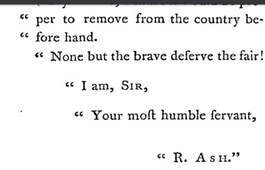 Oh, I get it Melinda’s tone veers between calm and prim even when recounting the time she spends in Mr. Viner's company. They attend a village wedding. "Mr. Viner… brought his German flute; he played some Scotch tunes, which Lady Wandle and I accompanied with our voices, to the seeming surprize of the (local peasantry) some of whom humbly requested to hear the tune of I’ll never leave thee, twice repeated."
Oh, I get it Melinda’s tone veers between calm and prim even when recounting the time she spends in Mr. Viner's company. They attend a village wedding. "Mr. Viner… brought his German flute; he played some Scotch tunes, which Lady Wandle and I accompanied with our voices, to the seeming surprize of the (local peasantry) some of whom humbly requested to hear the tune of I’ll never leave thee, twice repeated."When the marriage proposal does arrive, Melinda relates the event matter-of-factly, as though she was describing what she had for lunch. What did she say, you ask? Just what she ought, of course, a lady always does. She referred Mr. Viner to her parents. Well, she did acknowledge to Mr. Viner, and later to her correspondent Amanda, that she would never consider a proposal of marriage from any other man.
As I mentioned in an earlier post, Melinda's parents think Mr. Viner’s fortune is too modest and they pressure her to marry Mr. Ash, a Bristol merchant. During this section of the novel, Melinda actually acknowledges that she has emotions: "I did not close my eyes all night."
When Mr. Ash realizes he has a love rival, he challenges Mr. Viner to a duel. This gives the author a chance to make this joke with his name:
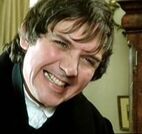 fair character Mr. Viner refuses to engage in the “Gothic” practise of dueling, and Melinda approves of his stand. Amanda encourages Melinda to hold out and never “give your hand to a man whom you can neither love nor esteem. Nothing but the most indigent circumstances, joined to the probability of being highly useful to a set of deserving relations, can, in my opinion, tempt any reasonable woman to make such a sacrifice of herself, nor even then, unless he be a man of a fair character.”
fair character Mr. Viner refuses to engage in the “Gothic” practise of dueling, and Melinda approves of his stand. Amanda encourages Melinda to hold out and never “give your hand to a man whom you can neither love nor esteem. Nothing but the most indigent circumstances, joined to the probability of being highly useful to a set of deserving relations, can, in my opinion, tempt any reasonable woman to make such a sacrifice of herself, nor even then, unless he be a man of a fair character.”Mr. Ash has a serious hunting accident, Mr. Viner charitably rushes to his assistance--but in vain. Mr. Ash dies and Mr. Viner catches a bad cold. The suspense of Mr. Viner’s illness lasts for a few brief letters before we have his recovery and our happy ending.
There is also an epilogue, a sermon on the meaning of Galatians 2:16, or works versus faith, which was also the burning issue in the next novel I will review, by Frances Trollope. Well, literally, they used to burn people over doctrinal issues, so that's a burning issue. Godfrey Frank Singer, in a 2016 review of epistolary novels, says of Melinda Harley, “The only two notable features of this work are that it has humor and that it closes with straight, non-epistolary narrative in which the threads of the story are tied together for the reader.” In her narrative summary, the authoress explains how Mr. Viner's excellent personality is the result of his parents' careful attention to his upbringing and the curbing of his temper. We also hear about the virtues of breastfeeding. I wonder if any modern novels include a plug for natural breastfeeding?
Singer is kinder than the reviewers who looked over the book when it was published. Let’s finish with some chauvinist snark from the Monthly Review, which pronounced it: “A very inoffensive, but a very dull and ill-written book, which, short as it is, the author has been under the necessity of ekeing out with—a sermon. If this piece of clumsy patch work was put together by a fair sempstress, we wish her better success in the labours of her needle, to which we would advise her for the future to confine her ambition.”
That reviewer assumes that the author is a female, as have I. She signs herself as “M.E.,” and this was, so far as I know, her only novel, I've found no information about her. I came across Melinda Harley when looking for examples of Bristol merchants in 18th century literature. A digitized copy of the novel can be viewed here.
I've always loved Austen's line in Mansfield Park, describing Mary Crawford's reaction to Tom Bertram: "she did not even want to attract him beyond what the simplest claims of conscious beauty required." Could this be a reference to Lord Chesterfield? "a decided and conscious beauty looks upon every tribute paid to her beauty only as her due..."
Perhaps Jane Austen did come across a copy of The History of Melinda Harley. As Elaine Bander remarks: "Ever thrifty, Austen found uses even for poorly written novels. Living as they did on a restricted income in a quiet country neighbourhood, the Austen family were in the habit of turning otherwise tiresome books and neighbours into sources of entertainment."
Singer, Godfrey Frank. The Epistolary Novel: Its Origin, Development, Decline, and Residuary Influence. United States, University of Pennsylvania Press, 2016.
Published on March 27, 2023 00:00
March 20, 2023
CMP#136 Agnes becomes Rosalia
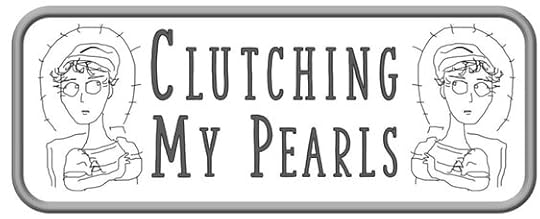 Clutching My Pearls is about Jane Austen and the times she lived in. The opinions are mine, but I don't claim originality.
Click here
for the first in the series. For more about other female writers of Austen's time, click the "Authoresses" tag in the Categories list to the right.
Clutching My Pearls is about Jane Austen and the times she lived in. The opinions are mine, but I don't claim originality.
Click here
for the first in the series. For more about other female writers of Austen's time, click the "Authoresses" tag in the Categories list to the right.
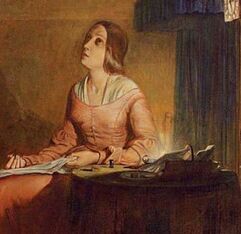 The Sempstress, 1846, Richard Redgrave CMP# 136 Who Was Rosalia St. Clair?
The Sempstress, 1846, Richard Redgrave CMP# 136 Who Was Rosalia St. Clair?In the previous post, I discussed the 1824 novel The Banker's Daughters of Bristol by Rosalia St. Clair, which combined conventional morality with some radical sentiments. It is easy to guess that "Rosalia St. Clair" is a pseudonym; the kind of romantic name that Anne of Green Gables might choose for herself.
Rosalia St. Clair was the pen-name used by Agnes Crombie Hall (1763-1846) for the novels she wrote for Minerva Press. As Rosalia, Agnes spun tales about dukes and earls with liveried servants and carriages. She also wrote about star-crossed lovers who needed nothing but each other and a little cottage. That is what the reading public wanted, but Agnes's life was a world away from the lives of her characters.
A publisher's foreword for one of her historical novellas, re-issued some years after her death, sketches her origins and then gives us a poignant anecdote: "Agnes Hall was “the only daughter of Mr. [John] Crombie [of Jedburgh, Scotland], a writer in [Jed]burgh, who flourished about the latter half of the last century; he possessed considerable property,.. Marrying a Dr. [Robert] Hall, a medical man... she left her native place only to endure a chequered life in the metropolis, for her lot was one of trial and privation. When the accustomed sources of support failed, she had to betake herself to her pen to eke out a precarious subsistence for herself and family… Her talents were not without recognition, for when reporting was more a literary art than it is now, she was engaged to attend the debates in the House of Commons as a reporter. Such were her extremities from domestic straits, that she was wont to borrow apparel for these occasions, from a pawn shop." "Extremities from domestic straits"
Agnes obviously came from an educated family, or as she put it, she was "educated to better prospects." Her father is described above as a "writer," which is a Scottish term for an attorney. He also served as the town clerk. Perhaps her father disapproved of her marriage to Robert Hall, who appears to have done more writing than working as a surgeon. It's understandable that the couple moved to London, rather than some less expensive place, because they needed to stay in touch with the magazine editors they wrote for. But you wonder why there was no help from the prosperous Mr. Crombie, especially considering the Halls had a daughter to support.
Dr. Hall, who wrote about medical research, lost "the chief part of his property by a fraudulent bankrupt." An obituary of Dr. Hall, probably written by Agnes herself, states that he wasted considerable funds in futile lawsuits to get his property back. I wonder if records still exist for those lawsuits, for those would reveal the name of the person who allegedly cheated the Halls.
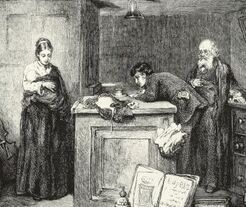 Her Poverty, But Not Her Will, Consents. (detail) Frank Holl. 1876. A woman pawns her wedding ring A tantalizing lead in the Scottish archives names a Robert Hall, surgeon, who was sent to Edinburgh in 1791 to stand trial for "violent assault" on James Potts, the sheriff clerk of Roxburgh.
Her Poverty, But Not Her Will, Consents. (detail) Frank Holl. 1876. A woman pawns her wedding ring A tantalizing lead in the Scottish archives names a Robert Hall, surgeon, who was sent to Edinburgh in 1791 to stand trial for "violent assault" on James Potts, the sheriff clerk of Roxburgh.
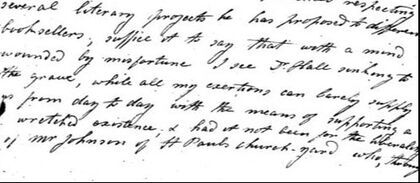 "I see Dr. Hall sinking into the grave, while all my exertions can barely supply us from day to day with the means of supporting a wretched existence" "A Wretched Existence"
"I see Dr. Hall sinking into the grave, while all my exertions can barely supply us from day to day with the means of supporting a wretched existence" "A Wretched Existence"Agnes Hall often wrote on topics that were usually the province of men. Scholar Gary Westfahl says she was chosen to contribute to Abraham Rees's Cyclopaedia because she was "one of the few women then deemed qualified to write on science and literature." Here you can see a letter to the editor from 1803, describing the invention of the diving-bell, and warning about the progress being made toward submarines which could be used to attack British shipping. Obviously her interests ranged widely and she was very tuned in to politics. She wrote on botany and literature for other encyclopedias as well. Her sympathies were with free-thinkers and dissidents like William Godwin (Mary Shelley's father), whom she corresponded with while she still lived in Scotland. When Agnes wasn't writing, she was taking in needlework and attempting to start her own business or get lodgers. She was producing magazine and encyclopedia articles about agriculture and botany, she was translating novels from French and German and even reporting on debates in the House of Commons. None of this was enough to live on. Agnes regularly applied for, and received, emergency funds from the Royal Literary Fund. I do wonder, in fact, if Mrs. Hall was the most frequent recipient of twenty pounds here, ten pounds there, from the funds for they came to her rescue at least sixteen times. Her many hand-written letters to the RLF tell a story of illness, disappointments and setbacks.
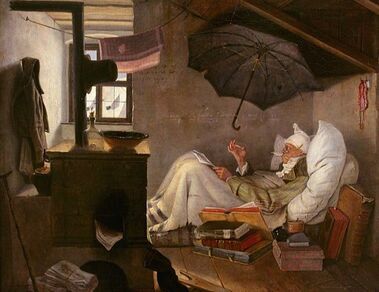 The Poor Poet, by Carl Spitzweg, 1839 In 1816, her husband joined an ill-fated expedition to explore the unknown territory of the Niger river in Africa. He was 53 years old at the time, and Mrs. Hall had already told the Literary Fund about his poor health, so you have to surmise that he took the post out of desperation. There is no way he would have been fit enough for an expedition up the river Niger. But his stamina was never tested, for on the outward voyage, he fell into an open hatch and injured himself severely. He was invalided home and never recovered his health. While her husband was slowly dying, Agnes wrote romantic novels about men returning home from the battlefields of India and the chains of Algerian captivity. Dr. Hall died in 1824, the year The Banker's Daughters of Bristol came out (one of the dozen novels she wrote.)
The Poor Poet, by Carl Spitzweg, 1839 In 1816, her husband joined an ill-fated expedition to explore the unknown territory of the Niger river in Africa. He was 53 years old at the time, and Mrs. Hall had already told the Literary Fund about his poor health, so you have to surmise that he took the post out of desperation. There is no way he would have been fit enough for an expedition up the river Niger. But his stamina was never tested, for on the outward voyage, he fell into an open hatch and injured himself severely. He was invalided home and never recovered his health. While her husband was slowly dying, Agnes wrote romantic novels about men returning home from the battlefields of India and the chains of Algerian captivity. Dr. Hall died in 1824, the year The Banker's Daughters of Bristol came out (one of the dozen novels she wrote.) Nobody could read Agnes Hall's file in the archives of the Royal Literary Fund without feeling sympathy for a woman who tried everything she could think of to earn a genteel living, including doing needlework and taking in lodgers, but appears to have been destitute for much of her life. One letter of support sent in the 1830's states: “She is of the first respectability and in great distress. The widow of Dr. Hall… she lost all her own private fortune by the failure of an Army Agent, [someone who administered army pensions and widows' pensions] and has now only a pittance of about forty pounds a year to support herself and daughter.” According to the RLF file, this agent was one James Window. who declared bankruptcy. As this occurred after Dr. Hall's death, it cannot be the earlier case of bankruptcy which ruined him.
Agnes also wrote that she'd been defrauded by the publishers Longman, Rees, Orme, Brown, & Green, who never paid her for a novella she wrote for them, titled Obstinacy, a title intended to fit in with a series of books for young people (Integrity, Decision, Patience) published by the more successful author, Barbara Hofland. No wonder she had bitter thoughts about “the absurd institutions of society, which so strongly tend to exalt the mere accidental distinction of birth, or the possession of property, over intellectual attainments or moral worth.” Perhaps she couldn't resist putting some of her angry outbursts into the thoughts of the heroines she created for Minerva Press.
Agnes Crombie Hall laid down her pen on December 1, 1846, at the age of 83. “On Tuesday morning last she got up and pursued her literary occupations till about eleven o’clock, when she complained of feeling cold at the stomach, and laid down on the bed.” Her daughter Agnes ran out to get help, “and on her return [discovered that the] deceased was a corpse.” She left a stack of unsold manuscripts, for as she put it thirteen years before her death, "I have outlived all of my literary friends connected with the periodical press."
She was buried at St. Pancras, in Camden town, where Mary Wollstonecraft was originally buried. The Gentleman’s Magazine eulogized her respectfully: “Mrs. Hall was a woman of varied talent, and possessed of so much native and inherent energy, that few circumstances, however disastrous, could wholly subdue or annihilate her power of mind.”
This woman and her story deserves to be rediscovered. What about her reports on the House of Commons? Is it possible to discover what outlet she wrote for? She broke gender barriers, she was a free thinker, and she sprinkled sedition into her sentimental novels. It was only dire financial necessity that caused her to hide her true name behind the moniker of "Rosalia St. Clair." I think the real Agnes didn't believe in romantic fairy tales. Although one contemporary newspaper gave her age of death as 70, Agnes Crombie Hall's birth (Jan 10, 1763) and baptism (Jan 26, 1763) records in Scotland as well as the many references to her age in her Royal Literary Fund file, confirm she was eighty-three when she died.
The Royal Literary Fund "is a British charity that has been supporting authors since 1790." Their website is here.
Dr. Robert Hall's great-grandfather was Henry Hall, a religious dissident of the Scottish variety known as Covenanters. He died in 1680 after resisting arrest at a time when religious disputes were political disputes, settled by fire and sword. Agnes herself appears to have been a skeptic.
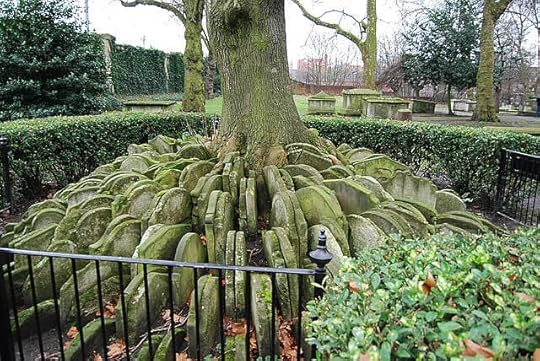 London , St. Pancras Old Church , The Hardy Tree -photo by isko66.jpg, Wiikimedia commons Perhaps Agnes's gravestone, if she had one, was one of those arranged around an ash tree by young Thomas Hardy, who had to move the gravestones to make way for the railroad. The
famous "Hardy Tree"
around which he placed the gravestones has recently toppled over, sadly.
London , St. Pancras Old Church , The Hardy Tree -photo by isko66.jpg, Wiikimedia commons Perhaps Agnes's gravestone, if she had one, was one of those arranged around an ash tree by young Thomas Hardy, who had to move the gravestones to make way for the railroad. The
famous "Hardy Tree"
around which he placed the gravestones has recently toppled over, sadly. Jane Austen's brother Henry was also an army agent and a banker. The failure of his bank in 1816 was a serious financial and emotional blow to the Austen family.
Westfahl, Gary. A Day in a Working Life: 300 Trades and Professions Through History ABC-CLIO, 2015. p. 801
Published on March 20, 2023 00:00
March 13, 2023
CMP#135 Louisa, the Radical Heroine
 This blog explores social attitudes in Jane Austen's time, discusses her novels, reviews forgotten 18th century novels, and throws
some occasional shade
at the modern academy. The introductory post is here. My "six simple questions for academics" post is here.
This blog explores social attitudes in Jane Austen's time, discusses her novels, reviews forgotten 18th century novels, and throws
some occasional shade
at the modern academy. The introductory post is here. My "six simple questions for academics" post is here.This book review for The Banker's Daughters of Bristol (1824) contains spoilers.
CMP#135 Book Review: Louisa, the Radical (but Compliant) Heroine
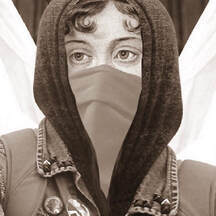 More radical than Austen In an earlier blog post, I referenced The Banker’s Daughters of Bristol, or, Compliance and Decision (1824) as a prime example of a novel which portrayed the Bristol mercantile class as avaricious and eager to rise in society.
More radical than Austen In an earlier blog post, I referenced The Banker’s Daughters of Bristol, or, Compliance and Decision (1824) as a prime example of a novel which portrayed the Bristol mercantile class as avaricious and eager to rise in society. But most of the novel has nothing to do with Jane and Maria Milsom, the titular characters. The central heroines, representing Compliance and Decision, are Louisa Gordon and Fanny Woodville. Louisa lives in a rustic cottage with her genteel but impoverished mother, and Fanny is the orphaned daughter of a star-crossed love match.
The Banker’s Daughters of Bristol is a strange mixture of hackneyed prose ("pellucid waters," “woo danger in the tented field”) and conventional morality punctuated with strong editorial outbursts. The narrator and some of the characters randomly exclaim against the government, the church, the army, and British society at large. That surprised me, since the novel is a product of the Minerva Press, printers of popular romance and gothic horrors for the reading public.
I wonder, did the publisher even notice these little protest speeches? Maybe he just gave the manuscript a brief glance--young man from good family is friendly with a poor family who have a beautiful young daughter whom he is forbidden to marry, check,brother kidnapped by Algerine pirates, check,another young man from good family is friendly with a poor family who have a beautiful young daughter whom he is forbidden to marry, uh... okay, check,dissolute old nobleman tries to force heroine into mercenary marriage, check, long-lost brother shows up under an assumed name but drops some exceedingly broad hints that he's not who he claims to be, check,hero returns from the dead, check, --but he missed the political parts. I am surprised at how openly critical these remarks are. We are told female authors could not express bold political opinions in these times--right?
And another strange thing about this story: we open Volume I with “Lady Waldegrave” and her bratty little boy, then, without explanation, we turn to a completely different cast of characters. Not even a dividing line--
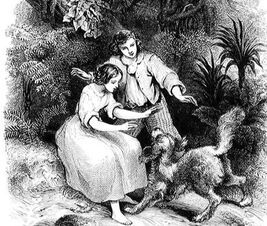 Growing up with the poor but lovely girl next door -- what could possibly go wrong? --to indicate the change of characters and scene. I really thought that the printers had put a few pages of a different novel at the beginning of the book by accident. We don't find out that “Lady Waldegrave” is Louisa until the end of volume 3. I'm guessing that the author was halfway into writing her novel when the publisher reminded her she had to have a Moral Lesson. She had already dealt with the selfish, foolish, banker's daughters (Jane marries a wealthy man but her marriage is unhappy, while Maria dies after a disastrous marriage), so she built up the storylines of Louisa and Fanny and tacked on the themes of Compliance and Decision.
Growing up with the poor but lovely girl next door -- what could possibly go wrong? --to indicate the change of characters and scene. I really thought that the printers had put a few pages of a different novel at the beginning of the book by accident. We don't find out that “Lady Waldegrave” is Louisa until the end of volume 3. I'm guessing that the author was halfway into writing her novel when the publisher reminded her she had to have a Moral Lesson. She had already dealt with the selfish, foolish, banker's daughters (Jane marries a wealthy man but her marriage is unhappy, while Maria dies after a disastrous marriage), so she built up the storylines of Louisa and Fanny and tacked on the themes of Compliance and Decision.But back to the editorial opinions. Here's an example: Fanny Woodville's father rejects the army and the church as a profession when he is looking for a way to support his wife after his dad cuts him off. “[H]e shuddered at the idea of sacrificing the right of private judgment, of becoming a part of a destructive machine, which, at the will of a junta, or the nod of a monarch, might be set in motion to crush the rising spirit of liberty amongst an oppressed people; nay, even perchance to shed the blood of his fellow-citizens when in the act of asserting the sacred rights of freemen, in opposition to the will of a corrupt and powerful faction—” Here we have an overt reference to the fact that the militia or the army was sometimes used domestically to crush popular uprisings.
As for the church, “To many of the doctrines of the church as original sin, the predestination of unborn millions to everlasting torments, etc. as being wholly repugnant to the divine attributes of justice and mercy, claimed not the assent of his reason: and to receive in any shape the wages of hypocrisy, was a debasement from which his honourable mind revolted with horror.” Later, the author gets sarcastic about the Trinity and the Thirty-Nine Articles . So a female author, a decade after Austen, openly deriding Christian doctrine in the equivalent of a mass-market paperback. Okey-dokey.
Later in the tale, Arthur Osborne, Louisa's love interest, impetuously joins the army after his dad refuses their marriage. Louisa weeps and wanders around the meadows and “mentally ejaculate[s]:” “Alas! No station, however exalted or however humble, can exempt human beings from the varied forms of sufferings to which their common nature is liable; why, oh why then, does the absurd institutions of society, and the evil passions of men, augment these sufferings in a tenfold degree?”
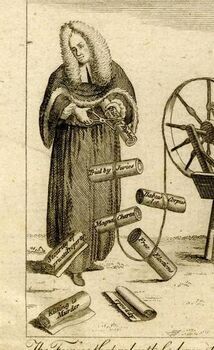 "Satire on Lord Mansfield (yes,
that
Lord Mansfield) and his judgements allegedly undermining British liberty."
"Satire on Lord Mansfield (yes,
that
Lord Mansfield) and his judgements allegedly undermining British liberty." Louisa, therefore, goes through several incarnations, as a sweet-natured country girl in volume 1, an angry radical in volume 2, and a vapid married woman in volume 3. She's also a painter of professional caliber in volume 2, although it's never mentioned again.
Here’s some of radical Louisa’s thoughts, as she tours a stately home and contemplates the portraits and family trees on the walls. You' would think she's about to get a nose ring and dye her hair blue:
“Here flourished a warrior… whose fiat perhaps let loose bands of legalized plunderers to sack and pillage peaceful cities, and put their inhabitants to the sword, to convert luxuriant fields into barren wastes, to spare neither smiling infancy nor decrepit old age, merely because they inhabited a geographical point in the globe, where credulity reached not to the same point in respect to some incomprehensible matter of faith as in the land of their invaders.”
“There, on the next branch, is recorded the name of an ermined judge, whose office gave him the enviable power of protecting the weak, punishing the oppressor, and extending equal justice to all; yet, for aught we know, he might be a perverter of judgment to please a royal master, or a corrupt court faction, a false expounder of the laws, the scourge, not the protector of the people.”
 Sir John Franklin, "the man who ate his boots," in the barren wastes of Northern Canada Anti-imperialist opinions
Sir John Franklin, "the man who ate his boots," in the barren wastes of Northern Canada Anti-imperialist opinions Given the prevailing emphasis on slavery and empire in literary academia, I always mention any references in the novels I'm exploring. In The Banker's Daughters, one young man is kidnapped by Algerine pirates and is enslaved in North Africa for several years, where he assists and befriends a kidnapped Spanish grandee and his beautiful daughter (as one does). (If you're unfamiliar with the history of enslaved Europeans, click here for an article about the Barbary pirates).
Volume 2 introduces the spinster “daughter of an obscure Indian adventurer,” aka “Sir Thomas Gourland, the rich old nabob…” with an immense East Indian fortune. People who lived in tropical climates and then came to England were often portrayed as being sickly or indolent, like Miss Lambe in Sanditon, "chilly and tender." The Gourlands are unhealthy and wrinkled as raisins. Like all nabobs, they flaunt their wealth: “The deep orange lining of the carriage, and the flame-coloured India shawl in which her person was wrapped, gave a cadaverous hue to her naturally dingy complexion." This heiress is married off to old Lord Woodville, grandfather to Fanny Woodville, the plucky heroine who displays a decisive character.
Although Fanny, orphaned and neglected, has been snatched from toiling as a milliner’s assistant and placed in a lavish mansion in London, she doesn’t develop warm feelings for her paternal relatives. Fanny regards her step-grandmother as: “the shriveled being who sat enshrouded in all the self-consequence of wealth and rank," [whereas Fanny] "inwardly reprobates the absurd institutions of society, which so strongly tend to exalt the mere accidental distinction of birth, or the possession of property, over intellectual attainments or moral worth.”
Fanny's grandfather sits in the House of Lords, and our authoress is scathing about his doings: “the peer rose and retired to his dressing-room, to prepare to attend the council, in order to persuade his colleagues that it was for the interest and the glory of Britain to squander away her blood and treasure in a contest about a barren nook of earth, and the right to trade in the furs of certain species of wild animals.”
This might be a reference to the Franklin Coppermine Expedition of 1819, but I’m not certain. Here’s what she has to say about the American Revolution and the War of 1812:
“The faithful pen of history will record [Lord Woodville's] name as one of that insensate band, whose pernicious counsels dismembered Britain of her fairest provinces, squandered away her best blood and treasure in a parricidal war against the independence of America, mainly assisted, by his borough interest, to corrupt the purity of legislation, and forge burdens for posterity [I presume she means taxes] which at some future period must either terminate in slavery or revolution.”
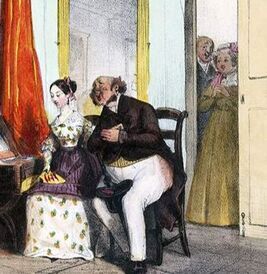 Up with this sort of thing Fanny will not put Meanwhile, back to our plot
Up with this sort of thing Fanny will not put Meanwhile, back to our plotNone of this has anything to do with the domestic drama. Lord Woodville might be about to drive the common people of Britain to “slavery or revolution,” but in his spare time he tries to force Fanny into marriage with the dissolute Lord Beauchamp. She firmly resists:
“I should be sorry, my lord, to give so near a relative any just cause of provocation; but if the continuance of your protection can only be secured by a sacrifice of principle and happiness, I must even make up my mind to resign your short-lived favour, and seek independence by the exertion of my talents.”
Lord Beauchamp is incensed at her refusal. “Go, proud beauty!” muttered the peer between his teeth; “a time may come when I shall make you repent this insolence.”
Actually, that time never comes. Fanny attends a masquerade ball and she is not even abducted. I think our author is what we today call a “pantser,” not a “plotter.” She’s making it up as she goes along. Characters appear and disappear and story lines start and peter out. As I mentioned, Louisa’s radical sentiments aren't congruent with someone who is supposed to represent compliance. Her mother, Mrs. Gordon is unfailingly kind, patient, and principled in the opening volume, but by the end of the book Fanny blames Louisa’s over-compliant nature on the “absurd education” she got from her mother, and Mom's patriotism and loyalty to the army are presented as ridiculous notions that only bring misery on the credulous women who offer up their husbands and sons for slaughter. The East Indian nabob’s daughter becomes a kind and considerate woman. “The native kindness and generosity of Lady Woodville’s disposition had been stifled and perverted by the early and inordinate indulgence in the luxury and effeminacy of the east. The love of rank and title were from infancy held up to her view by a weak and ignorant father, as objects of idolatry, yet when attained, she found them powerless to confer happiness…” Spoiler time
To wrap up, Louisa pines herself into a decline worrying about her sweetheart Arthur, sent off to fight in India. The family receives word that he's dead, but I for one never believed that for a moment. She ends up marrying Sir Marmaduke Waldegrave, a fellow who shows up in volume 3. He's a fairly decent chap but their marriage subsides into indifference. She becomes the indulgent mother of a spoilt little brat whose misbehavior leads to his death through an accident. She is the Lady Waldegrave who we meet in the opening pages of the novel.
After it's too late, Arthur Osborne reappears to discover the girl he loved is married. He's nursed back to health by Fanny, and he falls in love with her. Two other minor female characters also make happy love matches. The oldest banker's daughter, who tricked old Mr. Osborne into marrying her, runs off with an Italian opera singer once she's widowed, leaving her two young sons to be raised by Arthur and Fanny.
The Banker’s Daughter received one review, from The Literary Chronicle in November 1823, and it was brief but favourable. “The object of the novel… is to contrast the good effects of decision and firmness of character, with a weak compliance with bad advice, as exemplified in two characters. The moral is good, and the style of the novel, though not elegant, is generally correct.” Reviewers always kept an eye on morality in those days, and yet this reviewer either did not notice or was not concerned that the "fair author" threw in some anti-church speeches.
I've been pretty harsh about this novel, as a novel, but there is a whole other story here concerning the author, "Rosalia St. Clair" (of course this is a pseudonym). Her story deserves to be remembered and she was actually a woman ahead of her time who accomplished a great deal under miserable circumstances. Next post.... Previous post: Bristol Merchant wrap-up One of the ways we know that the banker’s daughters are vulgar and-ill bred is that they gossip with their ladies’ maid. "But dear me,” [Maria sighs] "now I should like to have Nancy Wilmot back again! She was so good at telling all the news, and so funny, that I used almost to split my sides with laughing at her.” More on servants in 18th-century literature and in Austen's novels, here.
Another forgotten female novelist who was quite outspoken was Ann Ryley (1760-1823). My series about her starts here.
Published on March 13, 2023 00:00
March 6, 2023
CMP#134 Bristol Merchants in Real Life
 Clutching My Pearls is about Jane Austen and the times she lived in. The opinions are mine, but I don't claim originality. Much has been written about Austen.
Click here
for the first in the series. CMP#134 Real-Life Bristol Merchants, then a Wrap-Up
Clutching My Pearls is about Jane Austen and the times she lived in. The opinions are mine, but I don't claim originality. Much has been written about Austen.
Click here
for the first in the series. CMP#134 Real-Life Bristol Merchants, then a Wrap-Up
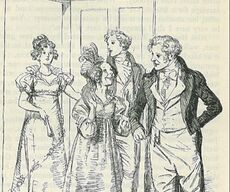 Mrs. Elton takes precedence at the ball In previous posts, I’ve shared information about novels and plays from the time of Jane Austen that featured Bristol merchants and their families.
Mrs. Elton takes precedence at the ball In previous posts, I’ve shared information about novels and plays from the time of Jane Austen that featured Bristol merchants and their families.While novelists portrayed Bristol merchants chiefly in comic terms, today their reputation is tainted, to put it mildly, by the legacy of the slave trade. So what did people think of real-life Bristol merchants, not fictional ones, during the 18th century? The reaction was more nuanced than we might assume. According to this history of Bristol : "Civic pride ran high… during the 'golden age' of the eighteenth century, the business community of Bristol acquired an enviable reputation for shrewdness and entrepreneurial vitality."
On the other hand, one man's "shrewdness" is another man's "underhanded." Bristol merchants also had a reputation for being insular, crafty, and vulgar. And yes, we'll tie this all back to Mrs. Elton, the Bristol merchant's daughter in Emma...
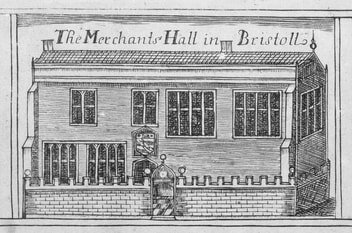 Merchant's Hall in 1728 Historian Charles Knight traced the origins of the reputation for pushy vulgarity that dogged Bristol merchants in his 1859 Popular History of England: “At that period Bristol was cursed with a very exclusive prosperity; and its uneducated freemen, amongst whom strangers were jealously forbidden to settle, indulged, when their adventurers were prosperous, in that vulgar display which is the general accompaniment of sudden riches.”
Merchant's Hall in 1728 Historian Charles Knight traced the origins of the reputation for pushy vulgarity that dogged Bristol merchants in his 1859 Popular History of England: “At that period Bristol was cursed with a very exclusive prosperity; and its uneducated freemen, amongst whom strangers were jealously forbidden to settle, indulged, when their adventurers were prosperous, in that vulgar display which is the general accompaniment of sudden riches.” Knight quotes Daniel Defoe, who in 1761 complained of the narrow streets and narrow minds of Bristol. “[Defoe] recommends [Bristolians] to travel to London—‘from the second great trading town to the first; and they will see examples worth their imitating, as well for princely spirit as for upright and generous dealings.’”
One thing to know about Bristol merchants is that there were merchants and there were Merchants with a capital "M". The Society of Merchant Venturers was an influential and exclusive guild who had, back in 1698, successfully lobbied to get a share of the slave trade which was then exclusively controlled by another corporation, the Royal African Company. (In a mercantile economy, it was the norm for people or groups to be granted monopolies on trading or selling various goods, including human beings.) So the word "merchant" could refer to “slave trader,” no question.
Not just anyone could become a Merchant Venturer. This useful website gives us an idea of the social standing of the Merchant Venturers. “They were a close-knit community that allowed only a few newcomers to join the group.” Mr. Hawkins met one of the necessary qualifications; he was born in Bristol. Whether he was prosperous enough to be considered a civic leader is another question.
An 1890 guide to Bristol explains the rules by which the society had long been governed: “Members are elected by the society, but they must be freeman of the city, that is, born within the limits of the thirteen parishes, now the heart of the city. Freeman are becoming scarce, as few now reside in these ancient parishes, they [the parishes that is] all being devoted to business.” I thought it was interesting that this book used the same term, “the heart of the city,” as Emma uses about Mrs. Elton, who was born in the “very heart of Bristol.” The Sucklings, of course, now live on an estate outside of Bristol, probably in Clifton. "Merchant--he must be called"
Emma believes “it was not unfair to guess the dignity of [Mr. Hawkin’s] line of trade had been very moderate.” He might simply have been a shopowner. As Charles Knight explains: “The Bristol shopkeepers were also merchants—‘wholesale men’ –and they conducted an inland trade through all the western counties… Roger North had observed that at Bristol all the dealers were engaged in adventures by sea; --'a poor shopkeeper that sells candles will have a bale of stockings or a piece of stuff [cloth] for Nevis or Virginia.’”
This may well be a good description of our fictional Mr. Hawkins. He might have been dealing in wool or ale or brass or soap in an economy that was buoyed up by the slave trade, and risked some of his money in speculating in overseas trade. #element-a0f9a2b1-fcb2-4e06-b21a-66f5b2407c96 .callout-box-wrapper { padding: 20px 0px; word-wrap: break-word;}#element-a0f9a2b1-fcb2-4e06-b21a-66f5b2407c96 .callout-box--standard { border: 4px solid #818181; background: #d5d5d5; padding: 15px 10px;}#element-a0f9a2b1-fcb2-4e06-b21a-66f5b2407c96 .callout-box--material { border: 4px solid #818181; background: #d5d5d5; padding: 15px 10px; box-shadow: 0 0 20px rgba(0,0,0,0.15);}#element-a0f9a2b1-fcb2-4e06-b21a-66f5b2407c96 .callout-base { border: 4px solid #818181; background: #d5d5d5; padding: 15px 10px;}#element-a0f9a2b1-fcb2-4e06-b21a-66f5b2407c96 .material { box-shadow: 0 0 20px rgba(0,0,0,0.15);} A sage Philosopher to try
What Pupil saw with Reason’s eye,
Prepar’d three boxes, Gold, Lead, Stone,
And bid three youngsters claim each one.
The first, a Bristol Merchant’s heir,
Lov’d Pelf above the charming fair;
So ‘tis not difficult to say,
Which box the Dolthead took away.
from "Tis Mystery All in Every Sect,"
Thomas Chatterton (1752-1770),
Native of Bristol
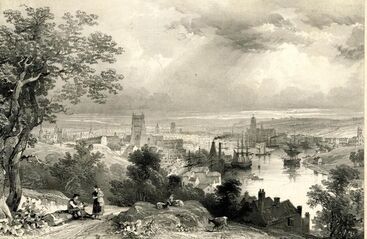 View of Bristol from Clifton Wood, 19th c. A Fling at the Slave Trade
View of Bristol from Clifton Wood, 19th c. A Fling at the Slave TradeThe connection between Bristolian prosperity and the slave trade is a topic that has come to the forefront for both history and literature, and that has caused many an Austen scholar to point to Augusta Elton, nee Hawkins, as a signifier of this connection.
One academic has asserted that Mrs. Elton's ten thousand pound dowry "was earned from the traffic in human flesh." If it was really ten thousand pounds and not just “so many thousands as would always be called ten,” then Mrs. Elton is bringing between four or five hundred pounds a year to her marriage with Mr. Elton, which, combined with his income, gives them a comfortable lifestyle with servants and a carriage. But Emma seems to think the dowry is nothing much (remember that Mary Crawford in Mansfield Park has twenty thousand pounds) and therefore the proceeds of Mrs. Elton’s father’s trade must have been “moderate.” Certainly, there were wealthier Bristol merchants, because the term “Bristol heiress” suggested a girl who could attract blue-blooded families willing to overlook her commercial background in pursuit of her hefty dowry.
Two suggestions are often made as underlining the hypothesis that Austen intended us to think of Mrs. Elton's connection to the slave trade.
First, many have suggested, and some have asserted, that Jane Austen chose the name “Hawkins” for Mrs. Elton’s maiden name to remind her readers of the slave trader Sir John Hawkins (1532-1595). Well, possibly. There were Eltons in Bristol as well. This 18th-century Bristol directory lists “Merchants and Traders, etc.” We find Hawkinses and Eltons engaged in selling goods and services.
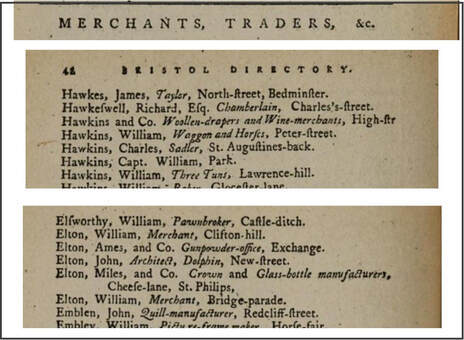 There is, lastly, that exchange between Jane Fairfax and Mrs. Elton where Jane compares the "governess-trade" to the slave trade. Mrs. Elton protests that "Mr. Suckling was always rather a friend to the abolition.”
There is, lastly, that exchange between Jane Fairfax and Mrs. Elton where Jane compares the "governess-trade" to the slave trade. Mrs. Elton protests that "Mr. Suckling was always rather a friend to the abolition.” I read this exchange not so much as a searing indictment of the slave trade, which was abolished eight years before Emma was published, but as a comic poke at people who want to forget their grubby origins.
By 1852, when Frances Trollope (another Bristol native) published her novel Uncle Walter, wealthy families were two generations or more removed from slave-trading, and one generation removed from owning slaves, and she puts this sarcastic reminder in the mouth of her main character: “Now Lord Goldstable’s grandsire, brother Harry, was a Bristol merchant who made the principal part of his huge fortune by trading in slaves.... It would be a curious examination,” [Walter] continued, “to go carefully through the true Englishman’s vade mecum, the peerage, and to observe how large a portion of the names inscribed there have obtained this glory under circumstances involving anything but honour to the individuals so distinguished." Yes, the reference to the slave trade makes Mrs. Elton uncomfortable. Speaking of being uncomfortable, let me make it clear: I am not rejecting interpretations of Mrs. Elton as a signifier of the slave trade because I don't want to introduce the topic of slavery into my cozy Jane Austen world. I am saying that I don't think the text of Emma supports the notion that Austen's reference to "merchant--he must be called," is an allusion to the slave trade. I think Jane Austen was a novelist of the long 18th century who was working within the framework and even the stereotypes of the novels of her day. And she presents Mrs. Elton as a pert, presumptuous, underbred, Bristol merchant's daughter in a manner that is entirely congruent with the comic stereotype of the vulgar Bristolian. Previous post: Vulgar Bristol Merchants in Literature
Published on March 06, 2023 00:00
February 27, 2023
CMP#133 “Of course they must be vulgar”
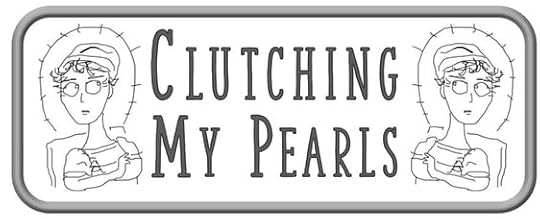 This blog explores social attitudes in Jane Austen's time, discusses her novels, reviews forgotten 18th century novels, and throws
some occasional shade
at the modern academy. The introductory post is here. My "six simple questions for academics" post is here. CMP#133 "Of course they must be vulgar:" More portrayals of Bristolians in old novels
This blog explores social attitudes in Jane Austen's time, discusses her novels, reviews forgotten 18th century novels, and throws
some occasional shade
at the modern academy. The introductory post is here. My "six simple questions for academics" post is here. CMP#133 "Of course they must be vulgar:" More portrayals of Bristolians in old novels
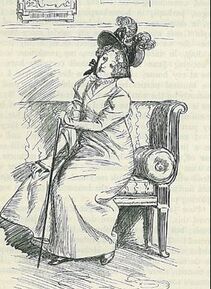 Hugh Thomson illustration In previous posts, I reviewed a novel called Nobility Run Mad which actually focused more on the marital mishaps of a wealthy merchant family from Bristol than on nobility behaving badly. It is one of several novels from the long 18th century which portray Bristol merchants as nouveaux riche who were given to flaunting their wealth and revealing their ignorance of true gentility. Later, I’ll give some historical perspective on real-life Bristol merchants but for now I am focussing on how these merchants were portrayed in novels and plays.
Hugh Thomson illustration In previous posts, I reviewed a novel called Nobility Run Mad which actually focused more on the marital mishaps of a wealthy merchant family from Bristol than on nobility behaving badly. It is one of several novels from the long 18th century which portray Bristol merchants as nouveaux riche who were given to flaunting their wealth and revealing their ignorance of true gentility. Later, I’ll give some historical perspective on real-life Bristol merchants but for now I am focussing on how these merchants were portrayed in novels and plays.As I mentioned, I got interested in finding examples of this comic stock character because of Mrs. Elton in Emma. It seems to me that she is an exemplar of a vulgar Bristolian, and Austen makes a point of specifying she is from Bristol, “the very heart of Bristol.”
As I find these novels, I am looking carefully for references to the slave trade and the attitude of the authors as revealed through their characters. While many a novel relies upon the sudden acquisition of a West Indian fortune as a plot device, they usually mention the West Indies without remarking on slavery at all, let alone the evils of slavery. The stereotypical Bristol merchant and his family are held up to criticism and ridicule in these novels--not because they were involved in the slave trade, but because they were vulgar and presumptuous... Extravagant or Miserly
Bristol traders, merchants, and bankers were portrayed in some novels as being either avaricious and miserly, as in Nobility Run Mad, or extravagant and showy, as in The Bristol Heiress. Their focus on making money was distasteful, though their fortunes were attractive to the landed gentry.
Melinda Hartley’s parents, in The History of Melinda Hartley (1778), pressure her to marry Mr. Ash, “who has been a Bristol merchant, and very successful in trade, having made at least a fortune of £60,000, some call it more.” But Melinda is in love with Mr. Viner, a gentleman of modest fortune but exquisite breeding, good manners, and sound principles. In contrast, Mr. Ash “bears the character of a very honest man, but at the same time seems to have a pretty high notion of his own importance, nor has he, in my opinion, sacrificed sufficiently to the graces, without which a man maybe rich indeed, but never can be agreeable.”
Mr. Ash does not bear comparison with Mr. Viner: “in spite of the great attention shown to Mr. Ash during the time of dinner, he appeared disconcerted and out of humour, destitute of that sweetness of temper and complacency of behaviour, the fruits of a liberal education, he appears to measure his regard for people, according to the weight of their purses, or to a ready compliance with his will.”
Fortunately for Melinda, Mr. Ash dies in a hunting accident, and she marries Mr. Viner. In The Spiritual Quixote (1820), Mr. Rueful bluntly explains to his friend Mr. Wildgoose why he is wearing expensive clothing—he is looking for a rich wife and must look the part: “For you must know, that is another reason for my appearing rather above what I can at present afford; and I had actually almost carried off a merchant’s daughter of Bristol, who will be worth twenty thousand pounds. But old square-toes would not part with cash enough down upon the nail; and the devil take me, if I would marry an angel upon the footing of a mere Smithfield bargain.”
We don’t know if the daughter of “old square toes” was an angel, for sometimes the wives and daughters of Bristol merchants were also portrayed as being vulgar. Mary Russell Mitford’s Our Village (1824), which is still read today, mentions “the rich wife of a Bristol merchant, a tun of a woman, abounding in loud vulgar talk, and full of coarse hospitality and noisy good humour,” rather like Mrs. Jennings from Sense & Sensibility.
Author Rosalia St. Clair combines ignorance and stinginess together with ostentation in The Banker's Daughters of Bristol (1824). Mr. Milson started out as “an obscure trader. The fortune he received with Miss Osborne, and his own successful speculations, in a few years raised him to short-lived opulence, but could not give to him either the feelings or the manners of a gentleman.”
Mr. Milsom, his wife and his two daughters all love wearing extravagant finery but they also enjoy driving a hard bargain: “Mind that, girls," [says their father] "a penny saved is a penny won, as the old proverb says; had I not attended to that in my youth, I should not now have been riding in my coach and six.”
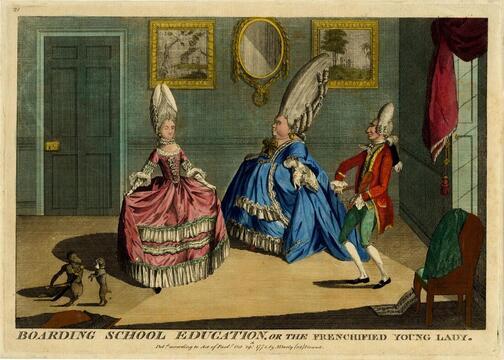 Such were the lessons which were daily poured into the ears of the young Milsoms, and such the example by which their manners and morals were formed and fixed into habits. Milsom, besides, though vain, ostentatious, and anxious to overtop his betters, as he termed his superiors in birth and education, was at bottom the most penurious and grudging of men. To see his wife and daughters outshine lady Willoughby, Mrs. Armer, and even the duchess of D----, was his chief boast and delight; yet every guinea drawn from his pocket for this purpose wrung his heart and a vigorous account was required of the expenditure of every shilling. Mother drags the girls around to “all the fashionable watering places… but without obtaining one eligible offer.” She is about to take them to London “when the death of her husband and the total ruin of his affairs compelled her to seek shelter [with her genteel widowed cousin] at Osborne Hall."
Such were the lessons which were daily poured into the ears of the young Milsoms, and such the example by which their manners and morals were formed and fixed into habits. Milsom, besides, though vain, ostentatious, and anxious to overtop his betters, as he termed his superiors in birth and education, was at bottom the most penurious and grudging of men. To see his wife and daughters outshine lady Willoughby, Mrs. Armer, and even the duchess of D----, was his chief boast and delight; yet every guinea drawn from his pocket for this purpose wrung his heart and a vigorous account was required of the expenditure of every shilling. Mother drags the girls around to “all the fashionable watering places… but without obtaining one eligible offer.” She is about to take them to London “when the death of her husband and the total ruin of his affairs compelled her to seek shelter [with her genteel widowed cousin] at Osborne Hall."This sets the mercenary cats among the country pigeons, for Mr. Osborne is drawn in by the wiles of the oldest daughter, Jane, who “had reached that equivocal period of life when time is peculiarly precious to the aspirant for matrimonial aggrandizement,” and he marries her, to the great dismay of his children Henry and Emma.
“Had [Henry] deemed Jane Milsom calculated to render his father happy, he would have been the first to rejoice at their union; but the cold selfish character of his cousin, her vulgar manners, and ill-informed mind, he was well aware could never assimilate with the frank generous nature of his parent.”
Before long, Mr. Osborne realizes he has married a vulgar spendthrift with terrible dress sense and no education. “At the head of her husband’s table, amid the polished and high-bred society which frequented Osborne Hall, she was sadly out of place. When subjects of literature were discussed, she was dumb; if the merit of poetry, or the drama, were the subject of conversation, to her it was like babbling in an unknown tongue.—With books she was unacquainted, except that class of novels which load the shelves of a provincial circulating library….” (Yes, another author who wrote novels for circulating libraries taking a poke at novels, just as Austen discusses in Northanger Abbey. It was a common thing!)
Meanwhile, the younger sister, Maria, is jilted by an army captain. Humiliated, she makes a hasty marriage to an army surgeon. This marriage ends in disaster and she ends her days poor, sick and miserable. In The Mysterious Friendship (1801), Benjamin Barton, a (you guessed it) Bristol merchant, takes in his orphaned nephew Francis, but when that nephew is successful in wooing a girl whom Mr. Barton himself wanted to marry, the hard-hearted uncle throws the lovers out of his house. He persecutes his nephew by giving him a bill for the cost of raising him up, and tries to send him to debtor's prison. Twenty years of poverty follow for Francis and his wife. She dies, then Francis learns that Mr. Barton repented on his deathbed and bequeathed Francis his entire fortune. The way that Mr. Barton made his money was not evidence against his good character, but his treatment of his nephew was.
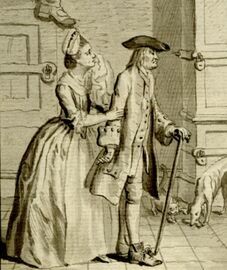 The Miser A long-standing stereotype
The Miser A long-standing stereotypeWilliam Combe, (author of Dr. Syntax) wrote an 1784 epistolary novel in which the narrator tells of a countryside stroll where he stops to admire a “pleasing little villa.” He speaks to the gardener, who tells him the owner is a Bristol merchant. “I thought it fairy land, and wondered that a Bristol merchant… should have the taste to adorn, or the feeling to enjoy, such a paradise. But, at the very moment that such a captious and illiberal idea glanced across my mind, the master of the place appeared to offer me, in the most obliging manner, the refreshments of his house.”
This particular merchant “had been in Denmark and told me of his voyage as well as satisfied me on some commercial points, with good sense and agreeable behaviour.” So perhaps this merchant has as little to do as possible with the slave trade and is trading in herring instead.
This novel and The History of Melinda Harley tells us that the stereotype of the boorish Bristol merchant was well-established in the public mind in the eighteenth century and it lived on into the nineteenth as well. In The Heir Expectant (published in 1870 but set in the 1840s), the miserly Bristol banker, Gilbert Waters, has a fortune of one hundred and fifty thousand pounds, but cuts off his nephew Austin for marrying a woman with no money. Years later, Uncle Gilbert dies and leaves his fortune to his nephew, but only after Austin and his wife have lost several children because of living in a damp and unhealthy house.
In A Charming Fellow (1878), by Frances Trollope, the snobbish Mrs. Errington decides “to decline the Bristol merchant’s offer to employment and a home for her son. Besides Algy’s 'genius,' there were other objections. Mr. Filthorpe had a vulgar wife and a vulgar daughter. Of course they must be vulgar. That was clear. And who could say that they might not endeavour to entangle Algy in some promise, or engagement, to marry the daughter? Nay, it was very certain that they would make the endeavour. Possibly—probably—that was old Filthorpe’s real object in inviting his young relative to accept a place in his counting-house.” Frances Trollope, mother of Anthony Trollope, was a native of Bristol, though her father was a clergyman, not a merchant.
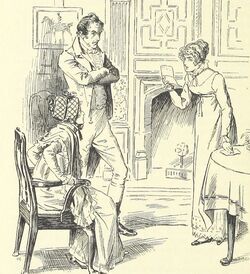 Mr. Gardiner is a sensible, cultivated, London merchant in Pride and Prejudice Some exceptions
Mr. Gardiner is a sensible, cultivated, London merchant in Pride and Prejudice Some exceptionsFerdinand Fitzormond (1805) is an exception to the rule about mentioning vulgarity but not slavery. Here the connection is made bluntly: “the widow Bembridge was the daughter and wife of a West Indian planter... one may venture, I believe, to affirm, that black was the colour of their prosperity; yet was their conduct and conscience not worse, possibly, than any other of the slave-buying or slave-whipping tribe. A brother of Mrs. Bembridge, a Bristol merchant, married a half sister of Lord B—and the young lady that has accompanied her hither, whom you saw last night, is the fruit of that union." Both Mrs. Bembridge and her niece Miss Dorville appear to be women of mixed race, so sometime I might plow through the five volumes of this novel to learn more about how they are portrayed.
Not all depictions of Bristol merchants were unflattering. In the comic play, He Lies Like Truth (1828), Merchant Truepenny is merely a straight man in a farce. His daughter's suitor, Mr. Rattler, provides the comedy. Harriet is a straightforward heroine and neither she nor her father are portrayed as being oafish or mercenary. The question of exactly how Mr. Truepenny got his pennies is also absent from the play.
In Maria Edgeworth's tale for children, Waste Not Want Not, Mr. Gresham is portrayed as an honorable man who lives well but sensibly. It's his nephew Hal, from the more genteel branch of the family, who is the careless and extravagant one.
In The Accomplished Hypocrite (1822) Emma Elliott's father is a kind and hard-working merchant, busy in his counting-house. Her mother is determined to force her into marriage with a nobleman she doesn't love. Miss Elliot is not vulgar or uneducated. Upstarts and Arrivistes
The more you look, the more you find class consciousness in Austen's novels. Austen uses Mrs. Elton's dialogue to illustrate her arriviste pretentions. Mrs. Elton frequently refers to her wealthy relatives, the Sucklings, who are perhaps one generation away from the slave trade (by the late 18th century, Liverpool had eclipsed Bristol as a center for the slave trade). The Sucklings, Mrs. Elton claims, are an “old, established” family who are dismayed by the arrival of some “upstarts” from Birmingham. “By their manners they evidently think themselves equal even to my brother, Mr. Suckling, who happens to be one of their nearest neighbours. It is infinitely too bad. Mr. Suckling, who has been eleven years a resident at Maple Grove, and whose father had it before him—I believe, at least—I am almost sure that old Mr. Suckling had completed the purchase before his death.”
The comedy here arises from the fact that someone who has had his country seat for eleven years is not considered to be at all in the same class as a family whose pedigrees stretch back for generations. Perhaps the Knightleys acquired Donwell Abbey from a Tudor monarch.
In real life, the Bristol merchant class had the reputation of being insular and of limiting acceptance into their ranks. More on that later. Fuller book reviews are coming for The Banker's Daughters of Bristol and The History of Melinda Hartley
Previous post: Nobility Run Mad, conclusion
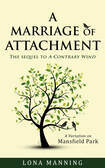 In the second volume of my Mansfield Trilogy, I introduce the character of Mr. Meriweather, a wine merchant from Bristol, widowed and looking for a wife. He is not at all vulgar. More about my novels here.
In the second volume of my Mansfield Trilogy, I introduce the character of Mr. Meriweather, a wine merchant from Bristol, widowed and looking for a wife. He is not at all vulgar. More about my novels here.
Published on February 27, 2023 00:00



